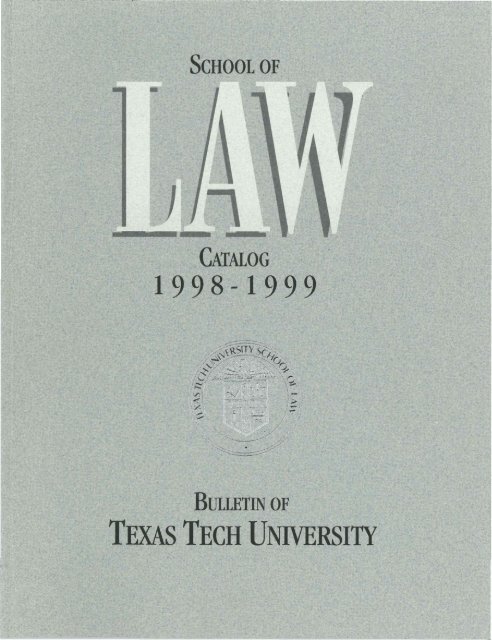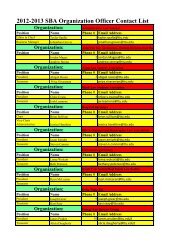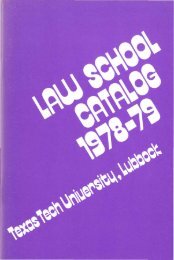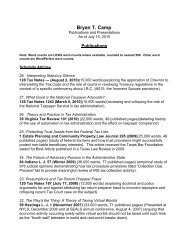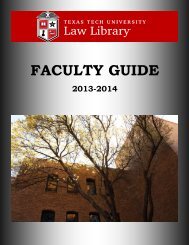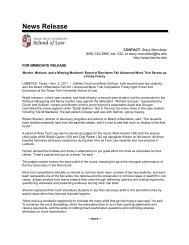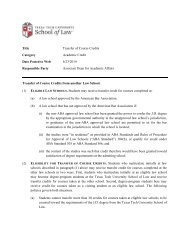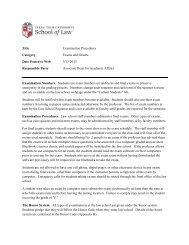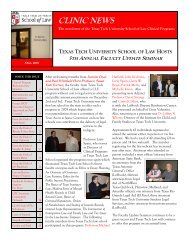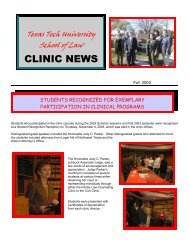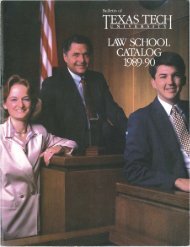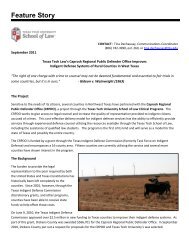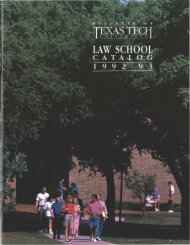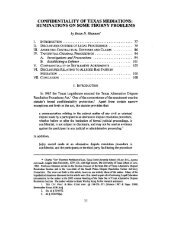1998-1999_Law School Catalog.pdf - The Texas Tech University ...
1998-1999_Law School Catalog.pdf - The Texas Tech University ...
1998-1999_Law School Catalog.pdf - The Texas Tech University ...
- No tags were found...
Create successful ePaper yourself
Turn your PDF publications into a flip-book with our unique Google optimized e-Paper software.
SCHOOL OFCATALOG<strong>1998</strong>-<strong>1999</strong>BULLETIN OFTEXAS TECH UNIVERSITY
A Message from the Dean 1ContentsAMessage from the Dean 1Mission Statement .. 3Profile of the <strong>Law</strong> <strong>School</strong>..... .. 5'<strong>The</strong> <strong>Law</strong> <strong>School</strong>................. .. 6'<strong>The</strong> <strong>University</strong> Community 12Curriculum 13Information for Applicants 21Student Affairs 27Finances .......... 35Directory 41Staff ...... .. 42Faculty 44Calendar 52 .Common Questions About theAdmission Process : 55Campus Map.................... 56Bulletin of <strong>Texas</strong> <strong>Tech</strong> Univetsity(USPS 075-460)Vol. LXXV NO.3 July <strong>1998</strong>Published quarterly by the Office ofOfficial PublicationsPeriodical postage paid at Lubbock, <strong>Texas</strong>. PO!itmasler,send address changes to Bulletin of <strong>Texas</strong> <strong>Tech</strong> <strong>University</strong>,Official Publications, Box 42026, <strong>Texas</strong> <strong>Tech</strong> Univer'sity,Lubbock,TX79409-2026.<strong>The</strong> <strong>Law</strong> <strong>School</strong> CllIa/og provides the procedures andpolicies in effect al the time of printing. Although theinformation is subjed to change, the published programrequirements for students who enter <strong>Texas</strong> <strong>Tech</strong><strong>University</strong> during the <strong>1998</strong>-99 school year form a legalcontract between the students and the <strong>University</strong>.While every attempt is made to ensure accuracy in itsreporting of programs, policies, fees, and other statementswithin this publication, the <strong>University</strong> reserves theright 10 make changes at any time without notice.All inquiries and correspondence concerning admissionshould be addressed to:Admissions Office<strong>Law</strong>$chool<strong>Texas</strong> <strong>Tech</strong> <strong>University</strong>1802 HartfordB,,,40004Lubbock, TX 79409..()(l()4(806)742-3791FAX (806) 742-1629e-mail XYDAW@ttacs.ttu.eduEvery law school has a unique characterdetermined by many factors, such as thequality and diversity of its faculty, the size ofthe school, the relationship of students andfaculty, and the attitude of the administration,staff, and faculty toward students.<strong>Texas</strong> <strong>Tech</strong> has a faculty of 26 full-timeprofessors as well as adjunct professors withexpertise in various areas of practice. <strong>The</strong>faculty reflects a broad spectrum of legalphilosophy and a wide geographical background.Over two-thirds of the faculty haveauthored books or book chapters, five facultyare elected members of the prestigious American<strong>Law</strong> Institute, and one faculty memberserves by appointment of the Governor as a<strong>Texas</strong> representative to the National Conferenceof Uniform <strong>Law</strong>s. Quality of teaching isstressed, as evidenced by the positive commentsof attorneys who have hired our graduates.Our curriculum is composed of coursesdesigned to provide a student with a strongfoundation in law appropriate to practice inany jurisdiction. Students can also chooseelective courses which emphasize practice andprocedure in the state of <strong>Texas</strong>.A special quality of the <strong>Law</strong> <strong>School</strong>-itssmaller size-provides an atmosphere ofinformality and accessibility that is pOSSiblewith a 23:1 student-faculty ratio. Smallerclasses a~low for more communication betweenfaculty and students, and the faculty"open-door" policy permits a student to visitwith instructors as needed beyond classroomhours.We are dedicated to encouraging studentsto develop their potential, and this attitude isreflected in the support provided by membersof the faculty and staff. We also like to thinkthat the <strong>Texas</strong> <strong>Tech</strong> <strong>Law</strong> <strong>School</strong> is uniquelysuccessful in nurturing student development.Our renovated <strong>Law</strong> Library provides <strong>Texas</strong><strong>Tech</strong> <strong>Law</strong> students with unparalleled support.Each student carrel, which is in reality a smalloffice, has a locked door, individually lockablebookcases, and a computer terminal to beshared by two students. We believe these arethe finest facilities of their kind availabletoday. Of course our students do not spendtime only in the library. Over the past tenyears students from the <strong>Texas</strong> <strong>Tech</strong> <strong>School</strong> of<strong>Law</strong> have won National Championships inmock trial, moot court, negotiating, and clientcounseling competitions.We hope this material will answer yourquestions concerning the procedure forapplying for admission and also the processused by the Admissions Office to review yourapplication. If after reading these materialsyou have questions concerning the school orthe admission process, please call our AdmissionsOffice.We are pleased that you are interested inseeking admission here.W. Frank NewtonDean
4 Profile of the <strong>Law</strong> <strong>School</strong> 5<strong>The</strong> <strong>School</strong> of <strong>Law</strong> is involved in several internationalprograms, including our ABA approvedsummer law institute at the Universidad deGuanajuato, Mexico, and our summer law instituteat the Universidad de Guadalajara, Mexico. Inaddition, we will also be involved in a continuinglegal education program in Mexico with theUniversidad Autonoma de Mexico. <strong>The</strong> faculty ofthe <strong>School</strong> of <strong>Law</strong> is fully committed to activeparticipation in programs and possibilities availablein the intemationallegal community.Finally, it is a part of the mission of the <strong>School</strong> of<strong>Law</strong> to render public service. In a variety of waysthe <strong>School</strong> of <strong>Law</strong> makes its resources available tocourts, government agencies, public interestentities, and other groups in the community on aregular ongoing basis. <strong>Law</strong> faculty members areinvolved in rendering legal assistance to the poorand in providing pro bono representation in publicinterest lawsuits. <strong>The</strong> <strong>School</strong> of <strong>Law</strong> participates inand is a part of <strong>The</strong> Institute of Environmental andHuman Health (TIEHH), a joint venture of <strong>Texas</strong><strong>Tech</strong> <strong>University</strong> and <strong>Texas</strong> <strong>Tech</strong> <strong>University</strong> HealthSciences Center to assess toxic chemical impacts onthe environment and on humans. Participation inthe work of the institute enables law faculty membersto render significant public service of regional,national, and international importance in the areasof environmental protection law and technology.<strong>Law</strong> faculty members have organized and participatedin institutes and seminars for the training ofmunicipal and county judges in the State of <strong>Texas</strong>,and have authored and published materials forthose institutes and seminars. In addition, lawfaculty members and administrators also holdelective and appointive positions in the State Bar of<strong>Texas</strong>, participate regularly in the work of theAmerican Bar Association, and hold membership inand serve with the American <strong>Law</strong> Institute. In all ofthese ways the <strong>School</strong> of <strong>Law</strong> implements itscommitment to public service and the use ofknowledge for the improvement of the administrationof justice and the improvement of the humancondition. By its involvement in public service, the<strong>School</strong> of <strong>Law</strong> also demonstrates for our students theimportance of this aspect of a lawyer's professionalfunctioning, and endeavors to impart to them anappreciation of the lawyer's obligation to renderpublic service for the betterment of the communitythroughout his or her professional life.<strong>The</strong>se missions of the <strong>School</strong> of <strong>Law</strong> are based uponour conviction that legal education can be a significantresource for the improvement of the lives of allmembers of our society, and the concomitant beliefthat our vocation of providing high quality legaleducation to men and women who are committed topublic service and the betterment of our society is oneof the most worthy tasks in which legal scholaIS andacademic institutions can be engaged.LubbockLubbock is a major regional center for business andindustry, located in the heart of the vast Southern·Plains ofWest <strong>Texas</strong> and Eastern New Mexico. Lubbock's locationproVides easy access to the Southwest, the Rocky Moun-~ir:; ~~t~a~~~~~tW~~~~~n~:e f%%i~~:~~~~and 520 miles from Houston. Lubbock's climate issemiarid and mild. It is the medical center for the entireWest <strong>Texas</strong> and Eastern New Mexico region. <strong>The</strong> populationis over 196,0Cl0.Resources<strong>The</strong> smaller size of the law school provides an atmosphereof informality and accessibility with the 23:1student-faculty ratio. <strong>The</strong> "open-door" policy allowsstudents to visit with faculty as needed beyond classroomhours. In addition to classrooms and semmar rooms, the<strong>Law</strong> <strong>School</strong> building has an expansive law library,courtroom, computer laboratory, office of career services,lounge area, snack area, locker room, student organizationoffices, and faculty and administrative offices.SIudo.I.In 1997, the entering class numbered 205 from an~~~Ji~fa~~ \:~ ~~J'(~~8 ~r~:~i:~lt~~~dr::GJ~ewas3.42. Ethnically, 12 percent of the students are minorities:~E~~~P:c~:~):I~~d~l~r~~~e~rJ~v~~~~:i~~~.peTh:ntfirst year class consisted of 104 male and 101 femalestudents.Foeully<strong>Texas</strong> <strong>Tech</strong> <strong>School</strong> of <strong>Law</strong> has a faculty of 26 full-timeprofessors as well as adjunct professors with expertise invarious areas of practice. <strong>The</strong>re are 6 administrators and~~:~r~fo~~gs~~~~~:~i~ ~~~i:l1ristration andTuition and Fees (Academic Year)Tuition and Fees.. . $ 6,520(Nonresidents add $5,070)Room and Board 4,934Books and Supplies 816Travel 1,514Miscellaneous and PersonalU21Total$16,1I08(Nonresident total $21,078)CoursesOur curriculum is composed of courses designed to~~fav~d~S~~~~~~ ~i~~; t~~fJ:~~~.ds~de~~~~naft:seelective courses that emphasize practice and procedure inthe state of <strong>Texas</strong>.Placement and the <strong>Texas</strong> BarAt ;a~~a~~~n~f41~:~::n~eg:~~~~~~r~ac~fu~I~~~:~~us.offers. Six months after graduation, 90 percent of the classof 1997 had accepted positions, with 97 percent of ourgraduates practicing m<strong>Texas</strong>. Private practice comprises~iFi:~n;~~li~~~t~rS~(U~~i~~~~::t:~~:~J~~~k~t~pthe other 2 percent.<strong>Texas</strong> <strong>Tech</strong> historically ranks at or near the number oneposition in the <strong>Texas</strong> Bar Examination results. <strong>Texas</strong> <strong>Tech</strong>'spass rate on the July 1997 <strong>Texas</strong> Bar Exam was 91.9percent.Library and Computer Facilities<strong>The</strong> <strong>Texas</strong> <strong>Tech</strong> <strong>Law</strong> Library provides students wide-~~1~~~I~~~~e~a~e¥~h~~~~~~doe~:h~~~~~~~~ht~rinted~~~g:ts~J~t:;~ :~ 1~~~~~~r~b!s:da~~~~ ~~a~h~nswhere students perform computer-assisted legal research,~fi~~_h~C;::~~n~.a~: s:~~~~~ ~~~t~~~:r~~~~e~ an~~~rl~~~nt the substantial collection of printed materialsJoint Degree ProgramsJ.D.-Master of Business AdministrationJ.D.-Master of Public AdministrationJ.D.-Master of Science in Agricultural and AppliedEconomicsJ.D.-Master of Science in Accounting (Taxation)Student OrganizationsAsian-American <strong>Law</strong> Students AssociationBlack <strong>Law</strong> Students AssociationBoard of BarristersChristian Legal SocietyCriminal Trial <strong>Law</strong>yers AssociationEnvironmental <strong>Law</strong> SocietyFederalist SocietyInternational <strong>Law</strong> Society<strong>Law</strong> ReviewLegal Computer SocietyLegal Research BoardMexican American <strong>Law</strong> Students Association~:;~~tt;;bd~~~fnts AssociationStudent Academic Support Servicesi:~:~ ~e~~s~aJ~fs~;ak~s':xiation<strong>Texas</strong> <strong>Tech</strong> <strong>University</strong> <strong>Law</strong> Partners<strong>The</strong> <strong>Texas</strong> Bank <strong>Law</strong>yerVolunteer <strong>Law</strong> Students and <strong>Law</strong>yersWomen in <strong>Law</strong>FraternitiesDelta <strong>The</strong>ta Phi, Phi Alpha Delta, Phi Delta Phi
6<strong>The</strong> <strong>Law</strong> <strong>School</strong>7<strong>The</strong> <strong>Law</strong> <strong>School</strong> at <strong>Texas</strong> <strong>Tech</strong> was establishedlargely through the efforts of attorney Alvin R.Allison, a former member of the <strong>Texas</strong> <strong>Tech</strong><strong>University</strong> Board of Regents, who saw a need for astate--supported law school in the West <strong>Texas</strong> area.<strong>The</strong> Board appointed the <strong>Law</strong> <strong>School</strong>'s first dean in1966, and in 1%7 the first class of 72 enteringstudents enrolled. In the fall of 1997totaJ enrollmentwas 637.<strong>The</strong> <strong>Law</strong> <strong>School</strong> was approved by the AmericanBar Association in August 1970 and is fully accreditedby the Supreme Court of <strong>Texas</strong> (1968) and by.the Association of American <strong>Law</strong> <strong>School</strong>s 1%9).<strong>The</strong> objective of the faculty is to train men andwomen for the practice of law anywhere in theUnited States, whether as advocate, counselor,judge, or law teacher, in accordance with thehighest traditions of professional responsibility. Atthe same time, the use of law as a stepping-stone toa career in government, politics, or business isrecognized. <strong>The</strong> curriculum and the instructionmethods are designed to develop in the studentstheir highest potential, whatever their reasons forstudying the law.In addition to classrooms and seminar rooms,the <strong>Law</strong> <strong>School</strong> building has an expansive Jawlibrary, courtroom, computer laboratory, office ofcareer services, lounge area, snack area, lockerroom, student organization offices, and faculty andadministrative offices.<strong>The</strong> law library features a 13,000 square footunderground addition and a number of studentcarrels fitted for computer terminals.<strong>The</strong> <strong>Law</strong> L1....ry<strong>Law</strong> libraries figure prominently in legaleducation, and the facilities of the <strong>Texas</strong> <strong>Tech</strong> <strong>Law</strong>Library provide students wide-ranging access tolegal information resources both print and on-line.<strong>The</strong> substantial addition to the <strong>Law</strong> Library gave<strong>Texas</strong> <strong>Tech</strong> students access to computer equipmentand facilities unparalleled in the nation. Traditionalstudy carrels were transformed into computer-basedworkstations, enabling students toperfono computer-assisted legal research, wordprocessing, and a number of other functionsin an office-like setting.<strong>The</strong> <strong>Law</strong> Library subscribes to both the LEXISand WFSTLAW computer-assisted legal researchdatabases, providing students access to legalinformation far beyond the limits of the printcollection. <strong>The</strong>se services feature access to primarysource materials, such as cases, statutes, andadministrative agency regulations and decisions.<strong>The</strong> databases also include a significant amount ofsecondary source material-such as legal periodicalarticles, treatises, and newsletters-and citators andindex.......uch as Shepard's Citations, the LegalResource Index, the Index to Legal Periodioals, andthe Current Index to Legal Periodicals. Training inthe use of computer-assisted legal research systemsis an essential part of the first-year curriculum.<strong>The</strong>se superior computer facilities complementthe substantial collection of print materials availablein the <strong>Law</strong> Library. <strong>The</strong> collection contains over2OO,1XXl bibliographic items, including boundvolumes, microforms, government documents, andCD-ROMs. <strong>The</strong> collection includes the reportedcases of the Federal and state courts, the statutes ofCongress and all state legislatures, and the rulesand decisions of Federal and <strong>Texas</strong> state administrativeagencies. <strong>The</strong> <strong>Law</strong> Library is also designated asa selective U.S. Government Documents Depositoryand collects a wide array of government documentsrelating to the law. Easy access to the RegionalDocuments Depository collection al the <strong>Texas</strong> <strong>Tech</strong><strong>University</strong> Library means that the substantial informationresources published by the U.s. GovernmentPrinting Office are readily available to law students.<strong>The</strong> collection of the <strong>Law</strong> Library contains over3,000 legal serial titles and a number of extensiveresearch aids such as digests, indices, and loose-leafservices. <strong>The</strong> catalog of the library collection is kepton-line, rather than in a card catalog, permittingmany different access points to the collection inaddition to the traditional means of author, title,and subject. <strong>The</strong> staff of the <strong>Law</strong> Library can locateresources in other library collections through theuse of a national network of libraries sharingbibliographic information used for cataloging andinterlibrary loan.<strong>The</strong> <strong>Law</strong> Library staff is comprised of knowledgeableand experienced librarians and paraprofessionalswho understand the importance ofproviding quality service to students and faculty.<strong>The</strong> staff includes six members with professionallibrary education; the director and associate directoralso have law degrees.In addition to the computer facilities, the <strong>Law</strong>Library physical plant includes a classroom usedboth for bibliographic insbuction and for studentmeetings, conference rooms for student studygroups, and a computer lab.<strong>Law</strong> <strong>School</strong> Computing<strong>The</strong> <strong>Law</strong> <strong>School</strong> computer network is designedto meet the specific needs of the students, faculty,and staff of the <strong>Law</strong> <strong>School</strong>. <strong>The</strong> network consistsof nearly 300 computers. <strong>The</strong> students have accessto 220 computers located in student study carrelsand 12 computers located in the school computerlab. <strong>The</strong>se are augmented. to two six-station com·puter labs dedicated to legal research (LEXIS andWFSTLAW).Two compute", equipped with high-speed CDROM drives are located in the main section of the<strong>Law</strong> <strong>School</strong> Library. <strong>The</strong>se computers allowstudents to quickly search the school's collection ofcompact disks (CDs) on a variety of subjects.<strong>The</strong> network computers are configured toprovide each student with the tools needed tocomplete course requirements and become familiarwith the standard software used in the legal profession.All networked computers are configured withWindows 95, WordPerfect 7.0, e-mail access,Internet browsers, and have direct access to LEXISand WESTLAW legal research sites. <strong>Tech</strong>PAC (theon-line library catalog system) and cOimection tothe campus main computer system are also availablefrom any computer on the school network.<strong>The</strong> low computer-to-student ratio assures thateach student can access the resources neededwithout scheduling or time restriction problems.This also allows freedom to the students in configuringtheir carrel computers to meet their individualneeds.<strong>The</strong> computer lab is equipped for full multi-mediaviewing and production. <strong>The</strong>se Pentium classcompute", are equipped with CD ROMs, soundcards, and presentation software. Two of thecomputers have View Cams for visual communicationsover the Internet. <strong>The</strong>re is also a specialcomputer set up with a full-page scanner andoptical character recognition software, as well as aread-write CD ROM for mastering individual CDs.<strong>The</strong> capability to convert video tape to digitizedvideo files is also available, and a digital cameramay be checked out by students.<strong>The</strong>re are nvo high-speed, high-eapacity laserprinters located in the computer lab. <strong>The</strong>se laserprinters can be accessed from any computer on thenetwork, providing reliable, high-
<strong>The</strong> <strong>University</strong> Community Curriculum 13rexas <strong>Tech</strong> <strong>University</strong> originally opened in the fallof 1925 as <strong>Texas</strong> <strong>Tech</strong>nological College with fourschools-Liberal Arts, Home Economics, Agriculture,and Engineering. By action of the <strong>Texas</strong> StateLegislature, <strong>Texas</strong> <strong>Tech</strong>nological College became<strong>Texas</strong> <strong>Tech</strong> <strong>University</strong> on September I, 1969. Todaythe <strong>University</strong> has an enrollment of almost 25,OOJand consists of the iruitructional colleges-AgriculturalSciences and atural Resources, Architecture,Arts and Sciences, Business Administration, Education,Engineering, Human Sciences--the <strong>Law</strong> <strong>School</strong>and the Graduate <strong>School</strong>. <strong>The</strong> <strong>Texas</strong> <strong>Tech</strong> <strong>University</strong>Health Sciences Center, a separate institution,opened in 1m.Many special facilities for interdisciplinaryresearch are available, such as the computer center,the Southwest Collection (a regional depository forhistorical information pertaining to West <strong>Texas</strong> andthe near Southwest), and the <strong>University</strong> Library'sexpanding collection of material in the general areasof the humanities.Located near the <strong>Law</strong> <strong>School</strong>, the StudentRecreation Center and the Aquatic Center offer awide variety of indoor sports facilities in addition toan Olympic-size indoor-outdoor swimming pool,tennis courts, and ball fields.<strong>Texas</strong> <strong>Tech</strong> <strong>University</strong> is located in Lubbock, acity of over 196,lXXl population with a variety ofcultural and recreational opportunities and a dryand invigorating climate.<strong>The</strong> city maintains more than sixty public parksfor those interested in sailing, sailboarding, tennis,softball, golf, and soccer. Cultural events includeperformances by the Lubbock Symphony and CivicBallet, while dramatic groups from the city, the<strong>Texas</strong> <strong>Tech</strong> theatre arts program, and occasionalBroadway traveling companies present a broadselection of theatrical fare.<strong>Texas</strong> <strong>Tech</strong>'s campus of 1,839 acres is one of thelargest in the nation, and with its attractive landscapingand unique Spanish Renaissance red-tileroofed buildings, is one of the most attractive.Programs of Study• DoctoroJJurisprudenceTo be recommended for the J.D. degree by thefaculty, a student must successfully complete aminimum of 90 semester hours, normally accomplishedin six semesters or five semesters and twosummer sessions. Acumulative average of 2.0 isrequired for graduation. Other academic requiJe..ments for graduation and for maintaining goodstanding are contained in the "Rules and Regulationsof the <strong>School</strong> of <strong>Law</strong>," which is given tostudents upon their initial registration and isavailable upon request.<strong>The</strong> grading scale is as follows: A=4.oo, 8+=3.50,B=3.oo, C+=2.50, C=2.OO, 0+=1.50, D=1.00, and F=O.O.Average academic attrition rate for first-yearstudents over the past five years is approximately9percent.<strong>The</strong> bar passage rate of graduates was 87.88percent for the February 1997 <strong>Texas</strong> bar exam and91.91 percent for the July 1997 <strong>Texas</strong> bar examrankingsecond among the state's eight accreditedand one provisionally accredited law schools.<strong>The</strong> <strong>Law</strong> <strong>School</strong> offers a full-time program only.Part-time enrollment is not permitted. Classes areoffered only during the day. Astudent may not takemore than 17 or less than 13 hours in any semesterwithout special permission. Twelve hours is consideredto be full time. <strong>The</strong>re is no minimum courseload requirement for students during asummersession; however, 8 hours is considered full time andstudents may not be registered for more than 10 hours.<strong>The</strong>).o. program provides a general backgroundin law, but the curriculum is broad enough thatstudents may, through their choice of electives,emphasize a particular area of the law such as tax,eslate planning, environmental, criminal, international,litigation, public, property, or business.Normally students must complete six semesters inresidence as a full-time student to meet graduationrequirements. Astudent may graduate a semesterearly-at the end of the fall semester of the thirdyear-by taking at least 12 hours over two summers(the equivalent of the sixth semester of residency).Regular attendance and preparation by studentsare required. Students should be aware that the <strong>Law</strong><strong>School</strong> must certify to the various boards of statebar examiners that each student has regularlyattended classes.Aprofessor may exclude a student from thecourse or from the final examination in the course ifthat student has accumulated an unreasonably largenumber of absences or instances of unpreparedness.<strong>The</strong> <strong>Law</strong> <strong>School</strong> faculty reserves the right to changethe schedule of classes, the program of instruction, therequirements for degrees, and any other similar rulesor regulations. This right will not be exercised,however, to impose substantial detriment uponstudents enrolled at the time of the change.• Doctor o!Jurisprudence-Master oj BusinessAdministration<strong>The</strong> <strong>Law</strong> <strong>School</strong> and the Graduate <strong>School</strong> of <strong>Texas</strong><strong>Tech</strong> <strong>University</strong> offer ajoint program leading to thedegrees of Doctor of Jurisprudence O.D.) and Masterof Business Administration (M.B.A.). <strong>The</strong> jointdegree allows a student to complete the requirementsfor both degrees in three or four years,depending upon the extent of leveling in businesscourses required. Astudent must apply to both the<strong>Law</strong> <strong>School</strong> and the Graduate <strong>School</strong> and be acceptedby both schools.<strong>The</strong> program is designed principally for thestudent with nonbusiness undergraduate trainingwho wishes to acquire a broad business knowledgeto complement legal training. For the student withsufficient previous course work, the degree may besecured by completing a total of 102 hours of lawand business courses. To satisfy the 90 hours of lawfor the J.D. degree and the 36 hours of business forthe M.B.A. degree, 12 hours of approved law coursesare transferred as elective credit to the M.B.A. degreeand 12 hours of approved graduate business coursesare transferred as elective credit toward the 1.0.degree. In some instances, astudent may be allowedto waive up to 12 hours at the M.B.A. level.<strong>The</strong> first year of study consists entirely of lawcourses. Ouring the second and third years, theremaining required law courses are to be completedtogether with selected law electives and an appropriatenumber of graduate business core courses.An acceptable score on the Graduate ManagementAdmission Test (GMAT) is required for theM.BA portion of the program. <strong>The</strong> College ofBusiness Administration is willing to accept astudent from the <strong>Texas</strong> <strong>Tech</strong> <strong>University</strong> <strong>School</strong> of<strong>Law</strong> into the J.D.-M.B.A. program if the student hastaken the <strong>Law</strong> <strong>School</strong> Admission Test (!.SAl). Thatstudent will not be required to lake the GraduateManagement Admission Test (GMAT).
1415• Doctor of]urisprudence-MJzster of Science inAgricultural and Applied EamomiesThis joint degree program follows generally lheoutline of the j.D.-M.B.A. and involves lhe cooperativeefforts of lhe <strong>Law</strong> <strong>School</strong>, lhe Graduate <strong>School</strong>, and lheDepartment of Agricultural and Applied Economics.To fulfill the 9O-hour requirement for the j.D. degreeand the 36-hour requirement for the M.s. degree, 12hours of approved courses from the Graduate <strong>School</strong>and the <strong>Law</strong> <strong>School</strong> are applied to the degree earned inthe other school. Thus, to complete the joint degreeprogram, the student will take 78 hours of law and 24hours of graduate agricultural and applied economics.Acomprehensive examination over the 18 hours ofcore course material for the M.S. degree must bepassed as a requirement for the degree. <strong>The</strong> first yearof study in lhe combined degree program is devotedexclusively to lhe study of law. After lhe first year,courses in both the graduate division of the Departmentof Agricultural and Applied Economics and lhe<strong>Law</strong> <strong>School</strong> may be taken concurnently.An acceptable LSAT score will be sufficient foradmission to lhe Graduate <strong>School</strong> for lhe M.S. portionof lhe program.• Doctor oflurisprudenee-MJzster ofPublicAdministrationAstudent may complete the requirements for a J.D.and a Master of Public Administration (M.PA.) degreein approximately four years if the student is enrolled inthe Center for Public Service and the <strong>Law</strong> <strong>School</strong> forthe combined degree program. Each school accepts 12hours of credit for approved course work completed inthe other school to fulfill the requirements for itsdegree, thereby reducing the total number of hoursrequired for bolh degrees. Thus, 78 hours of law and33 hours of graduate cou",," in lhe M.P.A. programmust be completed. Included in lhe 33 hours for lheM.P.A. portion is an internship assignment in agovernment office (6 hours credit) togelher wilhcourses selected from one of the seven specific fields ofconcentration. <strong>The</strong> first year of study consists entirelyof law courses. <strong>The</strong> student may elect to take therequired year of resident study atlhe Center for PublicService in the second or third year of the program. <strong>The</strong>remaining period of study may involve bolh schools.<strong>The</strong> Graduate Record Examination (GRE) must betaken and the score reported to the Graduate <strong>School</strong> aspart of the admission procedure to the M.P.A. portionof the program.<strong>The</strong> joint degree program is of particular benefit tolaw students who have career interests in administrativepositions at all levels of government and in publicagencies and institutions.• Doctor oflurisprudenee-MJzsler ofScience inAccounting (Taxation)<strong>The</strong> <strong>Law</strong> <strong>School</strong> and the Graduate <strong>School</strong> of <strong>Texas</strong><strong>Tech</strong> <strong>University</strong> offer ajoint program leading to thedegrees of Doctor of jurisprudence O.D.) and Masterof Science in Accounting-Taxation (M.s.). <strong>The</strong> jointdegree allows a student to complete the requirementsfor both degrees in three or four years, dependingupon the extent of leveling in business coursesrequired. Astudent must apply to both the <strong>Law</strong><strong>School</strong> and lhe Graduate <strong>School</strong> and be accepted bybolh schools.Up to 51 hours of leveling may be required; 18hours of core courses; and from 3 to 15 hours ofgraduate electives plus a capstone course requirementof 3hours. <strong>The</strong> student must obtain a grade of Borbetter and must have a GPA greater than 3.0 in orderto graduate.• <strong>The</strong> AppliCilliDn Procedure for loint ProgramsApplications for admission to joint degree programsshould be made to bolh the <strong>Law</strong> <strong>School</strong> and theGraduate <strong>School</strong> of <strong>Texas</strong> <strong>Tech</strong> <strong>University</strong>. Applicationsto the Graduate <strong>School</strong> can be obtained bywriting directly to that school. Applicants must meetthe regular admission requirements of each school andmust be accepted by each to be eligible for the program.Ifa student is undecided about whether topursue one of the joint programs, application to theGraduate <strong>School</strong> can be delayed until the beginning ofthe third semester in law school.• Summer <strong>Law</strong> Institute in Guanajuato, Mexico<strong>The</strong> <strong>Law</strong> <strong>School</strong>, in cooperation with Southwestern<strong>University</strong> and the <strong>University</strong> of New Mexico <strong>Law</strong><strong>School</strong>s, offers a summer institute in Guanajuato,Mexico. <strong>The</strong> program features an intnxiuction toMexican law and international law subjects related toLatin America. All courses are taught in English byAmerican and Mexican law professors. <strong>The</strong> Institutehas been approved by lhe Accreditation Committee ofthe ABA Section on Legal Education.<strong>The</strong> Institute is organized in cooperation wilh lheUniversidad de Guanajuato Farultad de Derecho, one ofMexico's leading law centers. This cooperative effortresults in a thorough introduction of non-Mexicanstudents to Mexico's legal and cultural systems.Coune.Scheduling of courses in any semester dependsupon lhe decisions of lhe faculty and the dean.Courses commonly offered are described below.First year courses are required. In addition to theadvanced required courses listed, there is an advancedlegal research and writing requirement thatstudents may meet during their second or third yearby completing a paper involving scholarly orproblem-solving legal research.• First Year CoursesOVIL PROCEDURE 5005.4 hIs.Ageneral survey using federal court procedure as a model,including jurisdiction of courts, pleading, disposition withouttrial, ;oinder of claims and parties, effects of judgments, andappellate review.CONSTJ1UI10NAL LAW 5001.4 hIS.Astudy of the federal judiciary's doctrine and practice ofjudicial review, judicial power, and jurisdiction of the courts,the power of Congress to regulate commerce, the power of thestates to regulate commerce, and the protection of privaterighlS, privileges, and immunities under the Constitutionwhich includes the substantive rights of freedom of enterprise,freedom of expression, freedom of religion, andfreedom from discrimination.CONTRACTS 5002.4 hrs.Astudy of the enforceability of promises, the creation ofcontractual obligations, performance and breach, the impact ofthe contract on the legal relationships of nonparties, and theexamination of contract doctrine in three settings: personalservicc, sales of goods, and construction contracts.CRlMJNAL LAW 5310.3 hIs.Inquiry into the source; and goals of the criminal law, limitationson the State's power to define criminal liability, generalprinciples otlliobility MK! defenses, oruI the chmcteristks off"'ticuJar crime>DISPUTE RESOLlTfIOI 5008. 2 hrs.Insbuction in dispute resolution processes other than litigation.Includes description of a variety of processes, includingcounseling, negotiation, mediation, and arbitration, with anemphasis on the lawyer's role in those processes.LEGAL PRACTICE I 5006.2 hrs.An introduction to the legal system covering case briefmg, casesynthesis, and statutory analysis, as well as principles andpractice of legal writing, client interviewing, and legalbibliographyandrescarch.LEGAL PRAmCE II 5007.2hIS.Instruction in legal method, including case and statutoryanalysis, through ob)ective and persuasive legal writing andoral argument. Instruction in the sources and use of materialsfor legal research, including computer-assisted research, andin legal citation. Written assignments includc \etters,memoranda, and briefs.PRQPERTI 5003.4hrs.An introduction to the law of personal property and realproperty, including estates and other interests in land, realproperty marketing and conveyancing, and landlord andtenant problems.TORTS 5004.,1m;.Standards and principles governing legal liability for intentionaland unintentional invasions of interests of personalityand property.• Adoonced Required Courses'BUStNESS EI
16 17PROFESSIONAL RESPONSIBILITY 6057.3 hI'S.<strong>The</strong> role of the legal system and the lawyer in American society,with special emphasis on professional responsibilities that alawyer has as private practitioner, corporate attorney, criminalprosecutor, government agency lawyer, judge, and legislator.Close attention is given to both the Code of ProfessionalResponsibility and the Model Rules of Professional Conduct.WILLS AND TRUSTS 6015.4hrs.Asrudy of the transfer of property by descent, wills, testamentarysubstitutes, and trusts including a study of constructionproblems.• Advanced Elective CoursesACCOUNTING FOR LAWYERS 6215.2hrs.Astudy of accounting and accounting concepts, particularly asdealt with in statutory law, judicial decisions, and administrativelaw. Designed to provide a background for advancedstudy in corporate finance and taxation.ADMINISTRATIVE LAW 6005.3 hrs.Examines the role of the administrative process in our society,formal and informal, and emphasizes the powers andprocedures common to all administrative agencies and therelationships among the legislative, judicial, and executivebranches in the development of public policy,ADVANCED COMMERCIAL LAW 6030.2 hrs.Astudy of Article 2of the Uniform Commercial Code whichcovers the law of sales. Included are the re
18 19fEDERAL JURlSmCTlON 6033.14 hrs.Astudy of lhejurisdiction of the federal courts and of theprocedural rules related 10 jurisdictional matters, including thelaw applied by the federal courts, federal question anddiversity jurisdiction, removal jurisdiction.. jurisdictionalamoUllt, appellate jurisdiction, and conflicts between the stateand national judicial systems.FIRST AMENDMENT 6068.2or 3 hrs.Study of the principal lines of historical, philosophical, anddoctrinal first amendment development and the primary firstamendment case law of the Supreme Court.GENDER DISCRIMINATION 6074.2or 3 hrs.This course addresses the many and various ways in whichgender issues and the law inle~ and interact. Topics rangefrom reproductive rights 10 sexual harassment.HEALTH CARE LAW 6066.2or 3 hrs.Provides an overview of aspects of health law including access,financing. quality of care, human reproduction. and death anddying issues. Relationships between patient, family, provider,regulators, and other interested lhird parties. Impact of publicpoIky.oo h'dmology on th
20 Information for Applicants 21RACE ANO RAOSM 6073.2or3hrs.This COUISe addn5ses the many arv:I various ways in whichrace and the law intersect and interact. Topics range fromaffirmative action to inlerracial adoption.REAL PROPERlY flNANCEAND TRANSACTIONS 6004.24 his.Astudy of residential and commercial real estate transactions.Topics of discussion will include: negotiating the purchase andsale contract, methods of title assurance; the secondary mortgagemarket; land acquisition and developmenlloans; variousmortgage instruments and alternatives such as adjustable ratemortgages, wrap around mortgages, leasehold mortgages,purchase money mortgages, sale and lease backs, and contractsfor deed; tax considerations in real estate transactions; shoppingcenters; condominiums; and cooperatives.REMEDIES 6007.2or3lus.Forms of legal and equitable relief acourt is equipped 10 grantby way of redress to those who have been or may be injured,including alternative choices and the tactical advantages ofeach.RESEARCH 7001.SECURITIES REGUlATION 6028.2or 3 hrs.Astudy of federal and state regulation of the public distnbulionof securities. Covers initial public offerings, the corporatedecision 10 "go public," the sale of registered and unregisteredsecurities, resales of serurities, disclosure required inaprospectus and offering curricular, civil and criminal liability,and enforcement of statute's anti-fraud provision under theFederal and <strong>Texas</strong> Securities Act.SKILLS DEVELOPMENT 7004.lor2hrs.lor3hrs.SPORTS LAW 6055.20r3hrs.Astudy of the law as it affects professional and amateur sports.It probes the relationships among the leagues, the individualdubs, the playm' unions, and the athletes. Topics covered areplayers' contracts, arbitration, remedies, antitrust issues, laborexemptions, discipline of players and dubs, collectivebargaining, liability for injuries, amateur athletics, and NCAAproblems.STATE AND LOCAL GOVERNMENT 6036. 2 or 3 hrs.Astudyof the law relating to the creation of local governmentunits, their legislative, fiscal, proprietary, and administrativepowers and functions, tort and contract liability. <strong>The</strong> relationshipbetween state and local government and inter-govemmentalconflicts will be discussed. Special emphasis is place:! on<strong>Texas</strong> law.TEXAS CRIMINAL PROCEDURE 6010. 2OJ 3 hrs.<strong>The</strong> law regulating the <strong>Texas</strong> criminal process from arrestthrough post-eonviction review with an emphasis on itsunique characteristics.TEXAS LAND TInES 6250.2 hrs.Contracts for sale of land; forms of deeds; descriptions;warranty and other covenants of title; escrows; recordingstatutes; practice in drafting; acquisition of title to landthrough adverse possession.TEXAS PRETRIAL PROCEDURE 6037. 2or 3 hrs.Astudy of the <strong>Texas</strong> law in civil cases pertaining to subjectmatter jurisdiction within the state system, jurisdiction ofpersons and property, pleadings, venue, parties, effects of prioradjudications, attacks on final judgments, discovery, anddisposition without trial.TEXAS TRIAL AND APPELLATEPROCEDURE 6014.2or 3 hrs.As1udy of the <strong>Texas</strong> law in civil cases pertaining to trial andappellate procedure conreming the jury, presentation of thecase, motions for instructed verdict, the court's charge, theverdict. trial before the court,. post-trial motions and procedures,final and appealable judgments, appellate jurisdiction,perfection of appeal, the courts of appeals, the Supreme Courtof <strong>Texas</strong>, and original proceedings in appeUate courts.TRANSAcnONAL PRACTICE 6084.2or 3 hrs.Course provides opportunity to plan, negotiate, and draft legaldocuments in the context of business, commercial, andemployment transactions. Fundamental concepts underlyingcontractual agreements will be emphasized.TRIAL ADVOCACY 6228.2 hI'S.Apractical course involving demonstrations and studentpractice in aU aspects of the trial of civil and criminal caseswhich provide significant opportunities for jury persuasion,instructor analysis and commentary respecting studentperfonnance and evaluation of trial tactics.WATER LAW fiJ1J.2or3hrs.Astudy of private law systems for aUocating waler amongusers, the public law systems of allocation,. groundwatermanagement,. development of new water supplies, intmtatedisputes, and water pollution.WORKERS' COMPENSATION 6230.2Ius.Astudy of the origin and substance of workers' compensationlaw and procedures before administrative tribunals and courts.Special emphasis on <strong>Texas</strong> statutes and procedure.This material has been prepared to acquaint youwith the application procedures and admissionprocess for the <strong>Texas</strong> <strong>Tech</strong> Univen;ity <strong>School</strong> of <strong>Law</strong>.Before preparing your app~cation, please readthis material carefuUy, and if you have unansweredquestions, contact our Admissions Office(806) 742-3985.Prelegal Education<strong>The</strong> <strong>Law</strong> <strong>School</strong> does not prescribe a specificprelegal curriculum for its applicants. <strong>The</strong> widerange of lawyers' tasks and the difference inofferings from college to college preclude such anapproach. However, there are certain goals thatprelaw students shouJd keep in mind when planningtheir coOege programs. <strong>The</strong>y shouJd strive toacquire the ability to read, write, and speak theEnglish language weU, to gain a critical unden;tandingof human values and institutions-politicaJ,economic, and social, and to develop in themselvesthe power to think creatively. <strong>The</strong> Official Guide toU.S. lAw <strong>School</strong>s: Prelaw Handbook published by the<strong>Law</strong> <strong>School</strong> Admission Council and <strong>Law</strong> <strong>School</strong>Admission Services contains a good discussion ofthe undergraduate background studenls shouldseek to acquire before entering law school. Acopyof this handbook may be ordered from <strong>Law</strong> Services,P. O. Box 2400, Newtown, PA 18940.0977.Application Procedure<strong>The</strong> following materials must be received by the<strong>Texas</strong> <strong>Tech</strong> <strong>Law</strong> <strong>School</strong> Admissions Office before anapplication file will be reviewed.1. ACOMPLETED APPLICATION FORM.Send to:Admissions Office<strong>School</strong> of <strong>Law</strong><strong>Texas</strong> <strong>Tech</strong> Univen;ityBox 400llLubbock, <strong>Texas</strong> 79409-lXXl42. LAW SCHOOL ADMISSION TEST SCORE.<strong>The</strong> LSAT/LSDAS Infomlotion Book contains aregistration form for the tSAT and can be obtainedfrom <strong>Law</strong> Services, Box 2400, Newtown, PA 18940(En, or from most college counseling and placementoffices. Arrangements should be made to takethe test in June, October, or December of the yearbefore the faU semester the applicant wishes to beadmitted. However, February tesls will be accepted.3. LAW SCHOOL DATA ASSEMBLY SERVICEREPORT (LSDAS REPORT). This service may beordered using the subscription form contained inthe LSAT/LSDAS Information Book. This can beobtained from any high school or four-year collegein the applicant's area. After registering for thisservice, the applicant should request each college oruniversity at which credit was earned toward theundergraduate degree to send transcripts to <strong>Law</strong><strong>School</strong> Admission Service (LSAS). LSAS analyzesthe undergraduate grade record and sends theanalysis to the <strong>Law</strong> <strong>School</strong>. LSDAS policies allowrenewal for up to two years following the end ofthe original subscription year. LSDAS reports willbe updated to include first-year lalV school matriculation.Cost of renewal is $54 and should be paid toLSDAS. For additionaJ information, contact <strong>Law</strong>Services, Box 2002, 661 Penn Station, Newtown, PA18940-0998, (215) 968-1001 (8:30 a.mAl:OO p.m. EST).4. APPLICATION FEE. Anonrefundableapplicationfee of $50 must be enclosed with your application.Checks should be made payable to <strong>Texas</strong><strong>Tech</strong> <strong>University</strong>.5. RESIDENCY OATH. All applicants mustcomplete the Residency Oath and return it withtheir application.6. PERSONAL STATEMENT AND REsUME.7. APPLICANTS FILE CARD AND REPLYCARDS. Please complete these four carns andreturn them with your application. Be sure thatyour address is written or typed on the cards beforereturning them. No postage is required.<strong>The</strong> following materials may be sent to supportyour application but are not required.1. Transcripls of graduate study. Graduategrades are not included in the LSDAS analysis.Graduate transcripls should be sent directly to theAdmissions Office.2. Letters of recommendation. <strong>The</strong>se are notrequired, but if letters are submitted, they should besent by individuals who are in a position to com-
22 23ment upon an applicanYs potential for studying lawbased on personal knowledge. <strong>The</strong> AdmissionsCommittee asks that applicants send no more thanthree recommendation letters. <strong>The</strong>y arc not influencedby the number of letters but by the quality ofthe letters.When to ApplyApplication may be made after the applicant hasearned 90 hours of undergraduate credit but allwork toward the baccalaureate degree must becompleted before enrolling in the <strong>School</strong> of <strong>Law</strong>.Candidates should not delay filing an application inorder to include later grades. An updated transcriptmay be submitted to LSDAS at any time and thecumulative grade-point average will be recomputedto reflect the additional grades.For consideration for fall, applicants are advisedto complete application by February. Four to sixweeks are normally required for processing theLSAT score and the LSDAS grade analysis.Applicants should be alert to the system ofacknowledgments used by the <strong>Texas</strong> <strong>Tech</strong> <strong>School</strong> of<strong>Law</strong> and by the <strong>Law</strong> <strong>School</strong> Admission Servi"" toinform them of receipt of application materials.LSAS sends an acknowledgment to the applicantupon receipt of the applicant's college transcripts.Since the LSDAS reports cannot be completed andsent to the law school until all transcripts requestedhave been received and evaluated, inquiries shouldbe made to LSAS (215/968-1001) if acknowledgmentsare not received within a reasonable time.<strong>The</strong> admissions staff of the <strong>Law</strong> <strong>School</strong> acknowledgesreceipt of the application and again informsthe applicant when the application is completedwith an LSDAS report.Applications are considered for the current yearfall enrollment only.Application Procedure for ForeignStudentsIn addition to completing the application foradmission, each applicant must also register for andtake the <strong>Law</strong> <strong>School</strong> Admissions Test. <strong>The</strong> <strong>Texas</strong><strong>Tech</strong> <strong>School</strong> of <strong>Law</strong> must receive official copies ofthe applicant's transcript(s) from the undergraduateschool. Each transcript must have a notation on itshowing that adegree was awarded. Upon receiptof the transcript, we will send acopy of it to anofficial of our university who will determinewhether the degree received from the foreignuniversity is the equivalent of an undergraduatedegree from an accredited university in the U.s. Assoon as this determination is made, the applicantwill be notified. An official Test of English as aForeign Language (TOEFL) score report showingproficiency in English must also be submitted priorto admission. <strong>The</strong> applicant must score at least 550on the TOEFL.AdMissions Process<strong>Texas</strong> <strong>Tech</strong> <strong>Law</strong> <strong>School</strong> operates an early actionadmissions policy. Applications meeting the earlyaction admissions criteria and received after theSeptember 1starting date are reviewed whencomplete and acceptance decisions are made within3 weeks. Other application decisions are deferreduntil after February 2. During February, March, andApril the committee reviews these files and makesacceptance decisions. Applicants are notified asthese decisions are made by the committee.When the committee believes sufficient acceptanceshave been received to complete the enteringclass, those applicants not selected will be notified.Asmall group of applicants may be asked if theywish to be placed on awaiting list if openings occur.Applicants are encouraged to apply as early aspossible to insure their files are complete and readyfor consideration by the committee early in thedecision-making process.Applicants applying after February 2will beconsidered for admission but should understandthat their chances of selection are somewhatdiminished. Late files will be fully considered afterthe regular applicant pool is reviewed.While considerable weight is placed on theapplicant's LSAT score and grade-point average, inmaking its admissions decisions, the committeelooks beyond the quantitative data to such factorsas background, experience, extracurricular activitiesand interests, and evidence of leadership qualities.• DepositEach accepted applicant is required to pay a $200deposit to hold a place in the entering class. Thisacceptance deposit will be refunded to the applicantupon matriculation at the <strong>Law</strong> <strong>School</strong>. One-hall ofthe deposit is refundable upon timely written notice ofachange in plans. Such notice is due May 1for falladmission. Applicants who fail to submit the $200acceptance deposit by the date specified in theacceptance letter will forfeit their place in theentering class.Application Evaluation<strong>The</strong> <strong>Law</strong> <strong>School</strong> Admission Test score and thecumulative grade-point average are equaUy importantin determining admission. However, theAdmissions Committee also considers several otherfactors when evaluating the LSAT score, the GPA,and the qualitative elements bearing on admissionsdecisions.• Undergraduate GradesWhile the cumulative GPA is used to categorizethe application on review, the progression (orregression) of grades over the fOUf years is consideredin weighing the GPA. Thus, the student whosejunior and senior leveJ performance evidences highquality may compete favorably with other applicants.Also, the difficulty of the undergraduateacademic program is noted.• Graduate WorkGraduate transcripts submitted with theapplication are reviewed and, depending upon thequality of the work, may enhance the application. Itis recognized that applicants may have severalreasons for deciding to attend graduate school priorto applying for law school. li by taking a graduatedegree the applicant is attempting to show that amediocre undergraduate record is not truly representativeof his or her academic ability, it is essentialthat the graduate record demonstrate outstandingperformance. Graduate work is only one of thefactors considered in evaluating an application.Consequently, attending graduate school for thesole purpose of securing entrance to law school isnot recommended. In any event, if graduate workis being contemplated, the applicant should pursuea graduate course of study which will enhanceother career opportunities as well as his or her lawschool application.• Repeat LSAT Scores<strong>The</strong> LSAT may be retaken. In deciding whetherto retake the LSAT, the applicant should considerwhether some element such as illness reduced his orher ability to perform up to potential on the test andwhether the score is reasonably comparable to pastperformances on other standardized tests. <strong>The</strong>second test score is averaged with the first score. Itshould be noted that while it is common for theapplicant to improve the !.SAT score on retake, alesser score on the second test is not rare. Consequently,there is some risk in the retake.• Work and Military ExperienceEmployment or military assignments, particularlythose experiences evidencing maturity orproviding a background which could be helpful to alawyer, are considered in the application review.• Writing Sample<strong>The</strong> LSAT writing sample is considered by theAdmissions Committee.• Other FadorsIn addition, the Admissions Committee willconsider the following factors: the socioeconomicbackground of the applicant, including the percentageby which the applicant's family is above or belowany recognized measure of poverty, the appli-eant'shousehold income, and the applicant's parents'level of education; whether the applicant would bethe first generation of the applicant's family toattend or graduate from an institution; whether theapplicant has bilingual proficiency; the applicant'sresponsibilities while previously attending school,including whether the applicant has been employed,whether the applicant has helped to raise children,or similar factors; the applicant's region of residence;whether the applicant is a resident of a rural or urbanarea or a resident of acentral city or suburban areain the state; the applicant's performance on theLSAT in comparison with that of other students fromsimilar socioeconomic backgrounds; the applicant'sinvolvement in community activities; the applicant'sextracurricular activities; the applicant's admissionto a comparable accredited out-of-state institution;and any other consideration the <strong>School</strong> of <strong>Law</strong>deems necessary to accomplish its stated mission.• New InformationAny time an applicant provides the law schoolwith new information regarding questions 11-15 on
24the application, the application review process willbe withdrawn and the file will go through thereview process again.• InterviewsMany applicants request interviews because theywish to discuss or explain academic records orbackground experiences. Because of the largenumber of applicants and time limitations, interviewsmust be limited. Interviews are encouragedfor that group of applicants who depend upon the"other factors" listed above for admission. Applicantsare encouraged to supplement their applicationswith new or revised material as needed at anytime before the admissions decision. Staff in theAdmissions Office are pleased to answer questionsregarding the application process and to addressany special problems encountered by individualapplicants. Information can also be secured fromprelaw advisors on undergraduate campuses ormembers of the law faculty of <strong>Texas</strong> <strong>Tech</strong> duringtheir visits to the campuses of <strong>Texas</strong> colleges anduniversities.ReapplicationAn applicant whose file was completed and whowishes to reapply for admission the following yearneed only secure a new application form and Oathof Residency. Submit them to the Admissions Officewith the $50 application fee after September 15prior to the year admission is sought. Materialsfrom the previous file will be transferred to the newfile. Unless more than three years have elapsedsince the last application, there is no needto reconstruct the materials in the file.Uan applicant withdraws after being acceptedand wishes to reapply for a subsequent year, only anew application form and $50 application fee needbe filed to complete reapplication. <strong>The</strong> new applicationwill be reviewed in comparison with otherapplications of that admission year. On review, theprior withdrawal acts neither as a detriment nor asan assistance to acceptance.Adlllission as a Transfer StudentAn applicant for admission as a transfer studentmust submit a completed application form and allsupporting materials required of an applicant for anentering class. In addition, the candidate fortransfer must provide (1) an official transcript fromeach law school attended showing grades for alllaw courses attempted and (2) a letler to the <strong>Texas</strong><strong>Tech</strong> <strong>School</strong> of <strong>Law</strong> from the dean of each lawschool attended concerning the present academicstatus and rank in class. (If the school or schools nolonger rank their students, we must also be advisedin which percentile of the first year class theapplicant stands.) <strong>The</strong> transcript and dean's lettermust be provided after all first year grades havebeen received. <strong>The</strong> applicant must have completedat least one year (approximately 28-30 hours) of lawstudy and be in good standing at an accredited lawschool to be considered for transfer. Transferstudents must complete a minimum of four semestersin residence to be eligible for a degree from<strong>Texas</strong> <strong>Tech</strong>.Because most applicants are attending the springsemesters in their respective schools and grades arenot available until June, most transfer decisions aremade in mid-summer. Factors such as availabilityof space, the number of first year courses needed,and the grade record are considered in makingthese decisions. Transfer applications are usuallynot approved unless the applicant is in the topquarter of the class. Credit is transferred forcourses in which the grade received is equal to thegrade average required for graduation from the lawschool at which the course was taken.Visiting StudentsStudents who are in good standing at anotherlaw school may be considered for admission on avisiting basis. An application for admission mustbe completed, an official copy of the law schooltranscript must be submitted, and a letter must befurnished from the dean of the law school thestudent is currently attending stating that thestudent is in good standing and that credit forcourses taken at <strong>Texas</strong> <strong>Tech</strong> will be accepted fortransfer.Good Character<strong>The</strong> <strong>Law</strong> <strong>School</strong> may deny admission to anyapplicant who, in the judgment of the faculty, mayappear to be unfit in character to engage in thestudy or practice of law.
26Student AHairs27Declaratlan af Intention te Study <strong>Law</strong><strong>The</strong> State Board of <strong>Law</strong> Examiners of <strong>Texas</strong> hasestablished the foUowing requirement:. .. f!Very person intending to apply for admission 10 the Barexamination in this State shall file with the Board a Declaration ofIntention to Study <strong>Law</strong>. <strong>The</strong> filing deadline for such Dedaratiorcsshall be as follows: Fall entrants, December I; Spring entrants,May 1; Summer entrants, September 15; ... Sudl Declaration shall bemade in duplicate on forms prescribed by the Board and shall showsuch fitClS as 10 the history, experience, and educational qualificationsofthededarant as the Board may require ..All students filing the Intent to Study <strong>Law</strong> formmust furnish a complete set of fingerprints. Fingerprintcards are attached to the declaration form.Students should take these cards to <strong>University</strong>Police Services for processing.<strong>The</strong> forms may be obtained from the Board of<strong>Law</strong> Examiners, Box 13486, Capitol Station, Austin,TX 78711, or in pelSOn from the <strong>Law</strong> <strong>School</strong> andshould be filed after classes start by the deadlinesshown above.<strong>The</strong> fee requined for filing the Declaration ofIntention to Study <strong>Law</strong> form is $125.Students who expect to practice in other statesshould investigate possible similar requirements insuch states.You will be required to submit, along withyour lntention to Study <strong>Law</strong> declaration, a copyof your law school application. Please make acopy of the application and keep it to submit withyour declaration.Profile of the 1997 Entering ClassFrom an applicant pool of 1,165 there were 205students admitted as members of the entering classin 1997. Of these, 101 were women. Minoritystudents comprised 12 percent of the class.For the fall entering students the average LSATscore was at approximately the 68th percentile, andthe average GPA was 3.38 on a 4.0 scale.Orientation and Counseling<strong>The</strong> <strong>Law</strong> <strong>School</strong> is firmly committed to the"open door" policy in faculty-student relations.From the first academic contact during orientationuntil graduation, the faculty is available for consultationwith respect to the course of study, problemsof general scholarship, and other matters relating tothe studenfs progress in school. With a lowstudent-faculty ratio, each student has abundantopportunities for extensive personal contact withthe faculty.Professional Enrich..entLegal educators agree that student developmentis greatly aided by professional experiences outsidethe classroom and by frequent and varied contactswith those actively practicing law. Advancedstudents may become adjunct members of thel.ubbock County Bar Association. All students areencouraged to attend meetings of the associationand various continuing legal education programs inwhich the <strong>Law</strong> <strong>School</strong> takes an active part. <strong>The</strong>Court of Appeals for the Seventh District of <strong>Texas</strong>sits in the courtroom of the <strong>Law</strong> <strong>School</strong> once eachsemester. <strong>The</strong> United States Tax Court holdssessions here each year. In addition, various stateagencies have held hearings in the schooL Studentsare welcome to obselVc these proceedings and alsoto visit any of the courts in Lubbock-federal, state,county, and municipal.Board af Barristers<strong>The</strong> Board of Barristers is a student organizationresponsible for promoting and administeringnumerous programs designed to develop awiderange of lawyering skills---murtroom advocacy,brief writing, client interviewing and counseling,and negotiation. Among the board's responsibilitiesare administering interschool and interscholasticmoot court, mock trial negotiations, and clientcounseling competitions; presenting skills clinicsand workshops; preparing and administering thefIrSt year advocacy seminars; presenting mock trialdemonstrations to various school groups; judginghigh school mock trial competitions; and providingsupport for the trial advocacy classes. Members ofthe board are selected from advanced students whohave demonstrated competence in advocacy,counseling, and related activities and who areinterested in assisting other students in improvingtheir skills.<strong>The</strong> Board of Barristers Association includesmembers of all former boards of the <strong>Texas</strong> <strong>Tech</strong> <strong>Law</strong><strong>School</strong>. Through the association, the present boardkeeps former members informed of the status ofinterschool competition teams and interschool oraladvocacy activities.In addition, the board assists in selecting membersof the interschool teams that compete acrossthe country.Several prestigious <strong>Texas</strong> firms have contributedgenerously to the support of the competitions andteams:Tom Hall '82 (pI. Worth)-Spring Moot CourtJackson & Walker (Dallas)-Fall Moot CourtJose, Henry, Brantley & Keltner (pI. Worth)-FallMock TrialBrian Loncar 'frl (Dallas)-NegotiationMehaffy & Weber (Beaumont)-First Year MockTrialMounce, Green, Myers, Safi & Galatzan (£1 Paso)First Year Moot CourtScott, Hulse, Marshall, Feuille, Finger & Thurmond(El Paso)-Spring Mock TrialAslan-A..erlcan <strong>Law</strong> StudentsAssociation<strong>The</strong> Asian-American <strong>Law</strong> Students Association(AALSA) promotes the professional needs and goalsof Asian-American law students. <strong>The</strong> organizationserves as asupport group and instills in the AsianAmerican law student a greater awareness of theneeds in the Asian community. AALSA is open toall law students.Black <strong>Law</strong> Students Assaciation<strong>The</strong> Black <strong>Law</strong> Students Association (BLSA)open to all law school students-attempts to focuson the many aspects of being an African Americanlaw student. <strong>The</strong> organization tries to recruitAfrican Americans and help them adjust to lawschool and life in West <strong>Texas</strong>.By being a viable working organization oncampus, BLSA hopes to expand and enhance thestudent body's knowledge of African Americans.
29Christian Legal Saclety<strong>The</strong> Christian Legal Society (CLS) promotesspiritual growth and fellowship among Christianlaw students and provides a Christian foundationfor the practice of law. Activities to further theseobjectives include Bible studies, faculty led seminars,meetings with prominent Christian lawyersand judges, and social events. Any student whodesires to contribute to the goals of CLS is eligiblefor membe"hip.Criminal Trial <strong>Law</strong>yers Association<strong>The</strong> Criminal Trial <strong>Law</strong>yeffi Association (CTLA)promotes the interests of students who intend topractice in the field of criminal law. Its purposesinclude the encouragement of professional growthof students to develop the prosecution and defenseskills of the membership, to assist members injoining other state and national associationc; devoted.to criminal defense and prosecution, and toprovide the opportunity to network with professionalsin the practice of criminal prosecution anddefense at both the federal and state levels.Environmental <strong>Law</strong> SocietyThis organization provides infonnational programsin the areas of environmental and naturalresource law, and to afford opportunities for studentsto regularly meet and discuss issues in these areas. Anenvironmental law job seminar is held annually toinform students of opportunities to practice in thearea. National and state meetings may be attended bymembers to increase their knowledge of environrnentallaw and meet students in Environmental <strong>Law</strong>Societies from <strong>Texas</strong> and around the United States. Allstudents at <strong>Texas</strong> <strong>Tech</strong> are eligible for membeffihip.FederaUst Society<strong>The</strong> Federalist Society for <strong>Law</strong> and Public PolicyStudies consists of legal practitioners and lawstudents interested in the current state of the legalorder. It is founded on the principles that the stateexists to preserve freedom, that the separation ofgovernmental powers is central to our Constitution,and that it is emphatically the province and duty ofthe judiciary to say what the law is, not what itshould be. <strong>The</strong> society seeks both to promote anawareness of these principles and to further theirapplication through its activities.<strong>The</strong> society works to reorder priorities within thelegal system to place a premium on individualliberty and the rule of law. <strong>The</strong> society strives toencourage serious consideration of constitutionalissues and the legal order by promoting scholarlydebate. Organization activities stress the pervasiveinfluence of constitutional issues and their effect oneveryday events. It is not the viewpoint that isemphasized, but the concept of free and open debatebetween different ~ves concerning importantissues. Only by realizing the importance of theConstitution and the ideals it represents can citizensguanmtee the Constitution's continued success as thefoundation of our republican govenunent.Fraternities<strong>The</strong> <strong>Law</strong> <strong>School</strong> has active chapte" of threeprofessional legal fraternities-Delta <strong>The</strong>ta Phi, PhiAlpha Delta, and Phi Delta Phi. Activities of thefraternities consist of professional development,school and community related services, and varioussocial functions.International <strong>Law</strong> Society<strong>The</strong> International <strong>Law</strong> Society (ILS) providesinformation to law students in practical areas ofintemationallaw and transactions and promotesawareness in the <strong>Law</strong> <strong>School</strong> community of thisincreasingly important area of practice. In recentyears, <strong>Texas</strong> has seen adramatic increase in internationaltransactions thereby creating new opportunitiesfor <strong>Texas</strong> attorneys. u.s concentrates on theareas of law and practice common in <strong>Texas</strong> that areinternational in scope. Such areas include banking,real estate, taxation, trade and investment withMexico and Latin America, ou and gas, exportimport,intellectual property, high-tech industry,and arbitration and litigation. Through guestspeakers, an ILS library, and various informationalsources, fLS assists students in identifying potentialareas of international legal practice. fLS has alsoproposed school participation in Jessup internationalMoot Court and course work in internationalbusiness transactions.<strong>Law</strong> Review<strong>The</strong> lmo Review is a professional legal journalmanaged and edited by second- and thind-year lawstudents. <strong>The</strong> lmo Review publishes both student-
30 31written notes and comments on various areas of thelaw and articles by professors, judges, and practicingattorneys. Membership in the <strong>Law</strong> Review is arecognition of superior academic achievement and aunique educational opportunity.<strong>The</strong> top-ranked first-year students are invited tojoin the LJw Review. In addition, two write-oncompetitions allow all students an opportunity tobe selected to the <strong>Law</strong> Review. An elected editorialboard governs the organization's operations. <strong>The</strong>presiding third-year editorial board elects theeditorial board for the following year from amongthe second-year members.<strong>The</strong> principal responsibility of <strong>Law</strong> Reviewmembers is to produce two publishable articles on acurrent legal problem. <strong>The</strong>ir work is done underthe supervision of the student editorial board, withthe assistance of a faculty sponsor. <strong>The</strong> editorialboard members supervise the second-year workand select and edit the professional articles.Legal Co..,uter Society<strong>The</strong> Legal Computer Society (LCS) was establishedto operate and maintain the <strong>Law</strong>line computerbulletin board system, to promote the awarenessand use of computers in the legal profession,and to educate members in how the emergence ofcomputers in society affects the law.Legal Research Board<strong>The</strong> Legal Research Board (LRB) is a studentorganization that offers practicing attorneys servicessimilar to those of a briefing staff. <strong>The</strong> boardmethodically researches requested legal topics andthen compiles the information in a memorandum oflaw. Board membership includes only select secondand third year students proficient in research andwriting. This service is a valuable research tool forthe practitioner, but is also an educational experienceto the legal training of <strong>Texas</strong> <strong>Tech</strong> law students.Mulcan A..erican <strong>Law</strong> StudentsAssociation<strong>The</strong> Mexican American <strong>Law</strong> Students Association(MALSA) is a new organization that wasformed to better serve the needs and goals ofMexican American law students at <strong>Texas</strong> <strong>Tech</strong>.MALSA objectives include recruiting and retainingMexican Americans, student support, job placement,and involvement in community projects.MALSA participates in the following activities:Mexican American Speaker Series, employmentforum, recruitment trips, accepted students phonebanking week, fooming an alumni directory,elementary school mentoring program, and varioussocial events.Minority <strong>Law</strong> Students Association<strong>The</strong> Minority <strong>Law</strong> Students Association (MLSA)encourages minority students to pursue a legalcareer and promotes the interests of minoritystudents already enrolled. MLSA schedules speakerswho represent minority interests, cooperateswith community organizations on projects relatingto minority groups, works with the AdmissionsCommittee to encourage minority student applicationsto <strong>Law</strong> <strong>School</strong>, and provides social events forits members.Olllega Lalllbda PhiOmega Lambda Phi is an organization of olderlaw students. Target audiences are professionalsreturning to school for a legal education, studentswho are also parents, and older students in general.<strong>The</strong> group's goal is to support students who haveexperienced more in life than four years of collegeand who consequently have broader interests thantraditional students.<strong>The</strong> group attempts to meet the special socialneeds of older students, provide enhanced jobsearch opportunities, and deal with problems ofchild care, divorce, single parenting, finandalobligations, and housing.Student Acadelllic Support ServicesStudent Academic Support Services (SASS) is astudent organization focusing on helping first yearstudents adjust to law school. SASS sponsors "howto" programs on topics such as taking exams,handling stress, class preparation, summer jobs, andclass scheduling. Both professors and studentsspeak at the "how to" programs (held during thefall and spring) and offer their tips and advice onhow to succeed in law school.SASS also sponsors a mentor program thatmatches first year students with second and thirdyear students. <strong>The</strong> program provides "first years"with friends who can guide them through thechallenging first year of law school.<strong>Texas</strong> Aggie Bar Assoclatlan<strong>The</strong> <strong>Texas</strong> Aggie Bar Association was founded in1996 on two principles: to aid the administration inrecruiting graduates of <strong>Texas</strong> A&M <strong>University</strong> tothe <strong>Texas</strong> <strong>Tech</strong> <strong>School</strong> of <strong>Law</strong> and to bring togetherformer students of <strong>Texas</strong> A&M who are currentlyenrolled at <strong>Texas</strong> <strong>Tech</strong> <strong>School</strong> of <strong>Law</strong> for the purposesof assistance and fellowship.We also carry out the traditions of <strong>Texas</strong> A&M<strong>University</strong> by joining with the local alumni organizationto help bring events such as Aggie Muster toLubbock. <strong>The</strong> organization is active in variouscommunity services, and all students are encouraged.to participate.<strong>The</strong> <strong>Texas</strong> Bank <strong>Law</strong>yer<strong>The</strong> <strong>Texas</strong> Bank <strong>Law</strong>yer (TIlL) is an organizationcomprised of students with an interest in conunerciallawand banking. <strong>The</strong> organization works withthe <strong>Texas</strong> Association of Bank Counsel to publishtheir newsletter, <strong>The</strong> <strong>Texas</strong> Bank <strong>Law</strong>yer.Through TIlL's weekly meetings, the student isexposed to discussions of current cases and developmentsin banking law. Students also contributewritten materials for publication in the monthlynewsletter and provide a service to bank attorneysstatewide by reading recent court cases and preparingconcise overviews of the opinions.<strong>Texas</strong> <strong>Tech</strong> Student Bar Association<strong>The</strong> <strong>Texas</strong> <strong>Tech</strong> Student Bar Association (SBA)was organized to promote the objectives of the legalprofession and the law student's transition into theprofession. Its membership encompasses the entirestudent body and its elected. officers act as the lawschool student government. AU students areeligible to participate in SBA activities and to attendthe regular meetings of officers. Officers areselected. by school-wide election at various pointsthroughout the academic year and serve as thevoice of the SBA in all official matters.<strong>The</strong> SBA engages in a variety of activitiesdesigned to enhance the educational and socialexperience of law students. <strong>The</strong> association sponsorsspeakers who discuss issues important to thelaw student and listen and act upon the concerns oflaw students and administration. It serves as a vitallink of communication between administration,faculty, and the student body. It provides a varietyof services, including a nonprofit bookstore andfunding of student organizations. Dues-payingmembers also receive special privileges such as theability to cash personal checks and sell textbooks inthe SBA bookstore and discounts to various lawschool functions. AU students are encouraged toparticipate and have a direct voice in their experienceat <strong>Texas</strong> <strong>Tech</strong> <strong>School</strong> of <strong>Law</strong>.<strong>Texas</strong> <strong>Tech</strong> <strong>University</strong> <strong>Law</strong> 'artnersAll persons involved in the lives of law studentsare encouraged to join ITU <strong>Law</strong> Partners. <strong>The</strong>organization offers a variety of social and serviceactivities for the "partners" and gives the students achance to break away from the books. TIU <strong>Law</strong>Partners work not only to provide support for theirstudents, but also to support the entire studentpopulation and provide general assistance to the<strong>Law</strong> <strong>School</strong>. Most importantly, the organizationprovides its members with the opportunity to meetother people with similar concerns such as housing,child care, and employment needs, as well aslearning how to deal with the pressures of livingwith a law student.Volunteer <strong>Law</strong> Students AssociationVlSA works in conjunction with West <strong>Texas</strong>Legal Services to provide legal assistance to indigentmembers of the Lubbock community. Studentsparticipate in trimonthly pro bono clinicswhere they are provided. with the unique opportunityto interview clients and examine pending legaldisputes. Students may also work under thesupervision of volunteer attorneys in the preparationof cases for trial or settlement.Although students receive no academic creditor monetary compensation, the program maintainswide student support and involvement.WOlllen In <strong>Law</strong>Women in <strong>Law</strong> (WIL) encourages women toparticipate fully in the legal profession. Its speakerseries is designed to benefit all students, andmembership is open to both men and women.Women in <strong>Law</strong> serves as the forum for discussingissues affecting women in <strong>Law</strong> <strong>School</strong> and intheir law careers. Members may attend seminars atthe state and local levels.
34FeesTo enable students to estimate expenses at thetime of entering the <strong>Law</strong> <strong>School</strong>, the followinginformation is offered.Each applicant accepted for admission mustforward a $200 acceptance deposit. Tuition for firstyear students who are residents of <strong>Texas</strong> is $160 persemester hour. Students who are not residents of<strong>Texas</strong> must pay tuition of $329 per semester hour.Al! students will have additional expenses ofapproximately $600 in fees and $350-$400 for booksand supplies in the fall semester. <strong>The</strong>se additionalfees and expenses will be slightly less in the spring.All entering students must pay at least one-half oftheir fall tuition and fees in June in order to holdtheir place in class. This payment will be approximately$1,600 for <strong>Texas</strong> residents and $2,900 fornonresidents.Tuition and fees for long term semesters may bepaid using one of the following options:Option 1: Payment of total amount due;Option 2: Payment of one-half of the amount dueinitially and one-fourth by the fourth week of thesemester and one-fourth by the eighth week.Tuition for summer terms must be paid in full.Students who move to <strong>Texas</strong> after reaching theage of 18 are considered to be nonresidents unlessthey have resided in the state for other than educationalpurposes for a period of 12 months irrunediatelypreceding enrollment. Questions of residencystatus frequently arise concerning members of theArmed Forces assigned to duty in <strong>Texas</strong> and personswho have been <strong>Texas</strong> residents but have moved outof <strong>Texas</strong> for employment. Applicants in these andother circumstances involving questionable residencystatus should seek clarification of their statusfrom the <strong>Law</strong> <strong>School</strong>.Information on programs and costs for studenthealth services, student insurance, recreationalsports, and student parking is made available atorientation.For more detailed information regarding residency,fees, veterans' exemptions from fees, refundpolicies, and loans, please see the current Undergraduate<strong>Catalog</strong> of the <strong>University</strong>.Financial AssistanceScholarships, loans, and a number of part timepositions are available at the <strong>Law</strong> <strong>School</strong> and the<strong>University</strong>. <strong>The</strong> <strong>Law</strong> <strong>School</strong> recommends thatstudents devote their entire time to the study of law.Students who are engaged in outside employmentmay be asked to withdraw from the school if theamount of time spent in outside employment isdeemed excessive or appears to interfere with fulltimestudy of law. Outside employment cannotexceed 20 hours per week. All accepted internationalstudents will have to provide documentationshowing financial responsibility. Before an 1·20 canbe approved, accepted international students willhave to show they will have access to $16,000. Anapproved 1-20 is required before an internationalstudent can obtain a student visa. Financial aid isavailable only to those students that are citizens orpermanent residents.• Financial Aid TranscriptsFederal regulations require that any student whohas attended a college or university other than <strong>Texas</strong><strong>Tech</strong> submit a financial aid transcript from each ofthe previously attended schools. This is a requirementregardless of how many hours were earned orwhether financial aid was received.• Review ProcessOnce the application has been received, theinformation will be reviewed to see if additionaldocuments are needed to complete the aid file. Ifadditional documentation is required, a letter will besent to the student's permanent address on file withthe <strong>Law</strong> <strong>School</strong> Registrar.• Application and EligibilityStudents applying for grants or loans mustcomplete a Free Application for Federal Student Aid(FAFSA) for <strong>1999</strong>-2000. <strong>The</strong> application will bebased on <strong>1998</strong> income tax forms and current assetinformation. Students should follow the writteninstructions carefully as to which questions toanswer (no student will answer every question). <strong>The</strong>college code number for <strong>Texas</strong> <strong>Tech</strong> is 003644. Listthe college name as <strong>Texas</strong> <strong>Tech</strong> <strong>University</strong> WestBroadway and <strong>University</strong>, Lubbock, <strong>Texas</strong>. <strong>The</strong>application must be complete. Please complete ALLapplicable sections of the FAFSA application.
36 37<strong>The</strong>p=rwill use federally approved formulasto detennine aminimum dollar amount that thestudent will be expected to amtribute toward the costof education (referred to as budget) based on thefinancial figures provided by the student. <strong>The</strong>expected contribution ~ called the Family Contribution(FC).<strong>The</strong> budget is the estimated average cost for a9montti period beginning in August and ending inMay. <strong>The</strong> budget for ttie <strong>1998</strong>-99 award year was:Tuition and feesRoom and boardBooks and suppliesTransportationMiscellaneousTotal budgetEligibility for need-based aid is the differencebetween the budget and Fe. For example:BudgetFeeedResident$6,5204,9348161,5142m$16,008$16,008UOO$14,808Nonresident$11,5904,9348161,5142m$21,078Astudent may not receive financial aid in excessof the total budget. Financial aid includes grants, allscholarships (on or off campus donors), collegework-study, and all loans.• Loon Application<strong>The</strong> Free Application for Federal Student Aid(FAFSA) ~ a general application that determineseligibility for all types of aid. It is OT the actualloan application that will be submitted to alender.Each student has the option as to what type of loanshe or she will apply to receive. Eligibility for loans iscontingent on other financial aid received andeligible need, based on federal formulas. <strong>The</strong> loantypes are as follows:I. Stafford (formerly the GSL). <strong>The</strong>re are two typesof Federal Stafford Loans (FSL) that you may beeligible for-subsidized and unsubsidized. Bothhave avariable interest rate. <strong>The</strong> subsidized FSL isbased on need. II you qualify, the government paysthe lender the interest due on it while you are inschool and during your grace period and defermentperiods. <strong>The</strong> unsubsidized FSL is for students whodon't qualify for asubsidized FSL or who qualify forless than the annual maximum limit on a FSL. Youare responsible for all interest that accrues on anunsubsidized FSL.<strong>The</strong> academic year limit on asubsidized FSL is$8,5(X), and the academic year limit on anunsubsidized FSL ~ $1O,1XXl. <strong>The</strong> repayment periodfor the loans is 10 years. Interest rates vary butcannot exceed 8.25% adjusted each july 1. <strong>The</strong>interest rate is based on the final auction of the 91day Treasury Bill held prior to june 1plus 3.1%.2. <strong>Law</strong> Access Loan (LAL) or <strong>Law</strong> Student Loan(15L). <strong>The</strong> application limit is $15,1XXl. <strong>The</strong>se loansmay be applied for through one of two companies<strong>Law</strong>Access or <strong>Law</strong>Loans. <strong>The</strong> conditions and ratesof interest are identical between the hvo companies.<strong>The</strong> interest rate is variable and adjusted quarterlybased on the bond equivalent of the 91-day TreasuryBill plus 3.25%. Students wishing to apply for eitherof these loan programs should first apply for FederalStafford Loans. Once astudent decides that he or shewants to apply for a LAL or 15L, loan applicationswill be required in addition to the FSL application.• Lender OptionsBoth types of Federal Stafford Loans may beobtained through any participating bank, savingsand loan, or credit union. [f astudent is unable tolocate alender, the student should contact theFinancial Aid Office for assistance. <strong>The</strong> same lendershould be used for all loans throughout thestudent's education. [f multiple lenders are used,the student likely will have multiple repaymentsupon graduation.• Tuition Payments and Check DisbursementAfter astuden(s file has been completed andreviewed by Financial Aid, an award nofice will besent to the student listing all financial aid awardedas of the date of the notice. <strong>The</strong> student will reviewthe notice completely, accept the financial aiddesired, sign the notice, and return it to FinancialAid. Astudent who has aexepted a grant or scholarshipand returned the award notice to Financial Aidprior to the tuition payment date in August wiIIhave the award applied to their tuition bill. Loanslisted on the award notice wiD not automatically beapplied to the tuition bill. Because loan checks mustbe endorsed by the student, Financial Aid cannotnegotiate the funds for the student. Loan checkscannot be disbursed any earlier than 10 calendardays prior to the first day of classes. This disbursementdate would be the fiJ>t day of regular classesfor all law students (not the orientation week)Note: All first-year law students accepted forfall enrollment will have theirfirst tuitionpayment (approximately $1,600) due in Junebefore the fall term. <strong>The</strong> Financial Aid Office isunable to assist witfl this payment.Before receiving the initial loan check on anyprogram, astudent must attend a federally requiredloan counseling session. <strong>The</strong> studen(s rights andresponsibilities and loan conditions are discussed.Asession for the flrst-year law students is usuallyheld during the week of orientation in August.All loans are disbursed in aminimum of twodisbursements (fall and spring). This federalrequirement is designed to assist students in budgetingtheir funds more efficiently.All aid must be applied to astudent's outstandingtuition and fee balance before any refund can bedisbursed to the student.<strong>The</strong> foUowing is areview of what is requiredbefore a loan check can be released to a student:1. <strong>The</strong> student must have attended loan counseling.2. An award notice must be completed and returnedto the Financial Aid Office.3. <strong>The</strong> student must be enrolled at least half-time(6 hours).4. Financial Aid must have received the student'sloan check.• SummerAidAny student w~hing to apply for summerfinancial aid must complete aSummer Supplementapplication. <strong>The</strong>se applications are available in thespring. Aseparate budget is calculated based onwhich terms the student is attending. Astudent whow~hes to apply for loan funds must complete aseparate loan application. <strong>The</strong> amounts will varyb~. ~n the balance of the academic year loaneligJbility that was not borrowed during the previous9 month award period.• Scholarships far Entering Students.<strong>The</strong> <strong>School</strong> of <strong>Law</strong> has more than eighty scholarshipsavatlable for each entering class. Somescholarships are designed to promote academicexcellence; others have been established to encouragestudent body diversity and to assist those infinancial need. In awarding scholarships, the <strong>School</strong>of <strong>Law</strong> evaluates the student using the same factorsas those considered in evaluating the application.<strong>The</strong>se scholarships range in value from $11XXl to afull scholarship covering tuition and fees andproviding a book allowance.Scholarship application forms are included withthis catalog. In the case of entering students,completed forms should be returned with theadmission application by February 3.• Scholarships far Adoonced StudentsAdditional scholarships are available forstudents in their second or third year and thesescholarships are awarded on the basis of academicperformance and financial need. Applications fromadvanced students should be returned to the <strong>Law</strong><strong>School</strong> by May 15.• Endowed FellowshipsJohn F. "Buddy" Maner Chancellor's BarristerFellowship (given by Wayne Reaud '74,Beaumont)• Endowed ScholarshipsAlvin R. Allison ScholarshipDurwood H. Bradley Scholarship (given by Mrs.Durwood H. Bradley, Lubbock)Kenneth H. Bums ScholarshipRobert Guy Carter Scholarship (given by Carter,Jones, Magee, Rudberg & Mayes, Dallas)R. Guy Carter Scholarship (given by R. Guy andPhyllis Carter)Christian Lega1 Society Leader's Scholarship (givenby Kevin '% and Ginger '95 Nelson, Amarillo)William e. Clark Scholarship (given by Mrs. j. e.Clark and David G. Clark, Lubbock)Coleman-Hall Presidential Scholarship (given byTom G. Hall '82 of Ft. Worth)Brad Crawford Memorial Scholarship (given byfriends and family)Crenshaw Memorial Scholarship (given by theCrenshaw family)Faculty Opportunity ScholarshipFiJ>t Graduating Class Scholarship
39Tom and Lisa Hall Scholal1ihip (given by Tom '82and Lisa Hall, Ft. Worth)Dr. Arthur G. Hansen Scholal1ihip (given by Dr.Hansen and W. Stephen Rodgers '79 of Bryan)Richard W. Hemingway Scholarship (given byformer students and friends)Junell Family Presidential Scholarship (given byFrank Junell, San Angelo, and sons Robert '77 ofSan Angelo and Dan '85 of Austin)John E. Krahmer Scholal1ihip (given by the <strong>Texas</strong>Association of Bank Counsel)Judge Pat Boone Memorial Scholal1ihipGeorge H. Mahon Fellowships (given by the LittonFoundation)Owen W. McWhorter Scholal1ihipOwen W. McWhorter Tuition Scholal1ihip (given byLubbock Area Foundation)Joe H. Nagy Scholarship (given by the Nagy family)G. Hobert and Aileen Hackney Nelson Scholal1ihip(given by the Nelson family)Harold and Marilyn Phelan Presidential Scholal1ihip(Lubbock)W. R. Quilliam Scholal1ihip (given by W. ReedQuilliam, Jr.)W. Reed Quilliam Jr. Presidential Scholarships (givenby Phil '71 and Ruth Adams and other friends ofProf. Quilliam)Runge-Howard Scholal1ihip (given by Barbara K.Runge '74 and Rusty Howard, Houston)Travis Shelton Scholarship (given by <strong>Texas</strong>attorneys)W. F Shiver Scholarship (given by Judge David E.and Larisa Shiver Keltner '86, Ft. Worth)Edward R. and Jo Anne M. Smith Schola!1ihip(Lubbock)John H. Splawn, Jr. Memorial Presidential Scholarship(given by John '74 and Carolyn Simpson,Lubbock)Curt F Steib, Jr. Memorial Scholal1ihip (given by theSteib family and friends)<strong>Texas</strong> Bank <strong>Law</strong>yer Editor Fellowship (given byLubbock National Bank)<strong>Texas</strong> <strong>Tech</strong> <strong>Law</strong> <strong>School</strong> Freedom Scholarships (givenby Martin B. Leewright '85)<strong>Texas</strong> <strong>Tech</strong> <strong>University</strong> Presidential Scholal1ihip(given by the <strong>Law</strong> <strong>School</strong> Foundation trustees)W. D. WIlson Memorial Scholal1ihip (given by theWIlson family)• Named S
')t'1Boarel of RegeRts• EDWARD Offims E. WHITACRE jR, ChairBERNARD A. HARRIS jR., Vice ChairJAMES L. CROWSCN, Assistant SecretaryMARCIE jOHNSION, Executive Director• MembersTerm Expires january 31, <strong>1999</strong>DR. BERNARD A. HARRIS JR. . . HoustonDR. CARL. E NOE... . DallasEDWARD EWHITACREjR.SanAntooioTerm Expires January 31, 2001J. ROBERT BROWN . El PasoJAMES ESCWELL . DallasALAN B. WHITELubbockTerm Expires january 31, 2003JOHN W. JONES . BradyDR. NANCY E. JONESAbilenej. MICHAEL WEiSS.... . L.ubbockPrIReipal AdMIRistrative OHloe..OHioe of the ChaRoellarCHANCE11DR JOHN I MOi'ffi'ORD, ProIessor of <strong>Law</strong>, 1996.BA, <strong>Texas</strong> (Austin), 1965; JD, 19611.DEPUIY CHANCE11DR JAMES LCROII'SCN, 1996.BA, Oklahoma, 1900; L.L.B, Soutmn MetOOdisl, 1963.VICE CHANCEllDR lOR CULlURAL DIVERS!1Y CAIHYALLEN,I997.B.BA, Stephen F. Austin State, 1961; M.Ed., 1969.VICE CHANCELLOR AND GENERAL COUNSEL PATCAMPBELL, 1961.BS., <strong>Texas</strong> <strong>Tech</strong>, 19611;j.D., 1971.VICE CHANCELLOR lOR INSIllUllONALADVANCEMENTRONDA j. JOHNSCN, 1997.BS., <strong>Texas</strong> (Austin), 1966; MBA, Houston BapiN, 1!1l1JEXECUTIVE ASSISfANT TO T.HE CHANCE11DR BEN LOCK,1996.B.BA, <strong>Texas</strong> (Austin), 19B1; M.BA, 1984.VICE CHANCE11DR lOR FACIlITIfO, PL.ANNING, ANDCONSffiUCllON DOUGLAS MANN, 1997.B.LA., Kamas State, 1965.VICE CHANCELLOR lOR ADMlNISfRATION ANDFINANCE JOHN OPPERMAN, 1996.B.A., <strong>Texas</strong> <strong>Tech</strong>, 1977; M.P.A., <strong>Texas</strong> (Austin), 1982; PhD.,1994.VICE CHANCELLOR lOR GOVERNMENTAL RELATIONSMIKE SANDERS, 1971.BA, Abilero Christian, 1966; J.D., <strong>Texas</strong> <strong>Tech</strong>, 197Il.VICE CHANCEllDR lOR SPEOAL PROjEClS WlllJAM G.WEHNER, 1m.BA, O~ahoma State, 1963.OHloe of the PresideRtPRESIDENT DONALD R. HARAGAN, Pro"",r 01Atm'"Phene Science and Gro
42SlaHAdministntive Sb1f. (&om left, ssted) N. Klinkenberg.J. Padgett,L"""(""""'g)LK.mp,'......C""""'""O.\I\Jli,un,Libmy SWf: (&un left. sealed) I
44Faculty45BENSONW. FBANK NEWTONDean and Professor of <strong>Law</strong>, 1985.B.A., Baylor Universily, 1965; J.D., 1967;LL.M., New York <strong>University</strong>, 1969; LL.M.,Columbia <strong>University</strong>, 1978. Admitted to~:~~~~~~p~ebl~~' International <strong>Law</strong>, Conflictof <strong>Law</strong>s, Commercial <strong>Law</strong>, Legal Practice)withO:ha:S%b~o;a~~~a~S;:; ~~~M~and Browder law firm of Midland, <strong>Texas</strong>,;~e~i~ffi:i~~i:,c~~i~ ~e~~j~r ~irk,concession mterest in Ecuador. Dean Newtonleftprivatepracticetoenlerthe/udgeAdvocate. Ceneral's Corps of the Uruted Stat~Navy. Imtially he served as defense counsel mgeneralandspeeialcourtmartials..Healsoserved as special proscct1tor for ma)or felonycases. After an assignment to the international~~;o~,~e~~~u~f~~~~=~~e:~affP~id=~?sk~~~~~~~f~~~~.Of theDean Newton retumed 10 <strong>Texas</strong> to join thefacu!tyat the Baylor <strong>School</strong> of <strong>Law</strong>..Inaddlhonto.teaching,h~wasanadvl.soronafh~j&:t~~f~~S~o H~v~i:ot~~:~~~u~~~e ~rof <strong>Texas</strong> as Chair of the Standing Committee~~~~~~ih:st~: :~~~ib~ ~:tters.Supreme Court of <strong>Texas</strong> as ChaiT of the <strong>Texas</strong>Equal Access to Justice Foundation. He alsoserves as Trustee of the <strong>Texas</strong> Center for LegalEthics and Professionalism and isactiveasamember of the American <strong>Law</strong> Institule.JOSEPN B. CONBOYAssociate Dean, 1982.B.S., Canisius College, 1954; J.D.,Georgetown <strong>University</strong> <strong>Law</strong> Center, 1956;~~~~~~,~;~~~~~~i~::g~~np~~~ii~~~~ ~:wYork and <strong>Texas</strong>.(Teaches-Trial Advocacy, Sports <strong>Law</strong>)Dean Conlx,ly practiced law in Buf.falo,~~wscYh:Lf~:l::r~h~ ~~If~~~aa~~~:rom~h~t~~. t~~Uyd!~le~~~t:ll~e;:~a~:p~~f:las the Staff Judge Advocale in Vietnam and inBerlin, Germany. Before retiring as a Colonel,he served as Deputy Judge Advocate forEU[f..~n Conboy acce ted a position asAssociate Dean at the ~niversity of MissouriColumbia <strong>School</strong> of <strong>Law</strong> where he served inboth an administrative capacity and as ateacher. <strong>The</strong>reafter, he moved 10theUniversi.tyof Alab.ama <strong>School</strong> of <strong>Law</strong> and continuedhls academiC ca~r. In 1982 he accepted the~osition of ASSOCiate Dean at the <strong>Texas</strong> <strong>Tech</strong>Si~c~:~ft ;:.e:;t~~;~h:h:n~~a:~~tat the U.S. Mihtary Academy at West Pomt asuniversity professor.KAY PAnON FLETCNERAssistant Dean, 1987.B.S., Baylor, 1971; J.D., <strong>Texas</strong> <strong>Tech</strong> <strong>University</strong>,1980. Admilted to practice in <strong>Texas</strong>.(fea~~iS~~~De~!~:yMA;~:~:~:~redf:~:l~ ~:~ti~~~N: iK:il~~tin~ih:~:andtrial work. She, left p~vate practice to accept aposition asCivl1 DiviSIOn Chief prosecutor mthe Lubbock County Distnct Attomey's Office.Dean Fletcher left her position a.s a governmentprosecutor to accept a poslti~n ascorporate c~unsel for a large pubhcly heldfood franchise co'lxlTation. Her work.there asin-house counsel mvolved issuesrelahngtofinance, employment law, and procurementcontracting. Dean Aetcheralsoworkedasacoordinator for outside counsel serving thecorporation.Dean Fletcher has served on numerouscommittees for the Lubbock County BarAssociation, as well as the State Bar of <strong>Texas</strong>and the American Bar Association She is~~a~:~n c;tr~~t~fo~ft~ni~~~f~~~hOOIi:~s\~~~~r~~~tna:i~~~~~~1e t::~1~~~sand other law schools. Shealsoservesashaisonfor the <strong>Texas</strong> <strong>Tech</strong> <strong>Law</strong> <strong>School</strong> Alumni Association.Dean Fletcher is currently activeasamember of the National Association of <strong>Law</strong>Placement.DAISY NURST FLOYDAssociate Dean and Professor of <strong>Law</strong>, 1991B.A., Emory <strong>University</strong>, 1977; M.A., 1977; J.D.,<strong>University</strong> of Georgia, 1980. Admitted tor;:::~~:~C~:~l~~:e~~~~~:idence,AlternativeDispute Resolution, Legal Research,Writing, and Ana!ysis)serv~~ g;~~l~~ft~~~ ~h;~;~ [;~re she~ft~a:h:~~fu~ ~?rt~~~~~~lre~,I&~f;a~tii~~~~~~t;t:; ~;=:~~~n~~Ft:~i;:~~ig:~~onlaw firm, she taught al the Univ.ersity of ~eorgia<strong>School</strong> of <strong>Law</strong> wnere she was Director of Legal~esepa~re:~ ~~~~~s been actively involved inJud~cial educatIOn smce 1986, both in <strong>Texas</strong> andnatIOnally. While ~ Geo~ia, she developed newmaterials for teachmg wnting to trial judges;those materials havebeen used throughoul thecountry. She is curn::ntly a faculty member of. the~~r;e~,A~~~~~n~~ ~f~[~a:m~~~:~e TnalAcademy of JudlciafEduc.ation. Professor Fl2d~;~:; ~~1:Th:~; X::i~~~f~I~~~~iJesand the <strong>Texas</strong>.Center fo~theJudiciaryona~~~~tKc~: ~6;~ ~rt~rgolf~~ C:~~~; J~ddesBench ~anual and a member of the Judicial fEERComnuttee of. the <strong>Texas</strong> Center for the Judiciary.Her.research mterests include the proper role ofthe ludge and the advocate in modern litigation.ofDANIEL N. BENSONProfessor of <strong>Law</strong>, 1973.B.A., <strong>University</strong> of <strong>Texas</strong>, 1958jJ.D., 1961;M.A., <strong>Texas</strong> <strong>Tech</strong> <strong>University</strong>, 1974. Admilledto praclice in the Dislrict of Columbia and<strong>Texas</strong>.(Teaches-Evidence, <strong>Texas</strong> Trial and AppellateProcedure, <strong>Texas</strong> Pre-trial Procedure, Criminal<strong>Law</strong>, Federal Criminal <strong>Law</strong>)Prior 10 teaching. Professor Benson servedasa law)'crand officer in the Judge Advocate~x~~~~~~ ~~~~l J~fe~m~o~ea~n~:ft~s mIradilionallegal assista~ce. <strong>The</strong>reafl~r, he was~~~\~~IID~f~~~~f 11~~~a~:~~Y;a7~h theDepartment of J~stice in Washington, D.c.,be~~~ ~~ ~~~~~lto~rtbr~~a~~;:dl~~~tesProfessorBensonengag~inprivalepractice in T~xas before turnmg to law schoolteaching. Hlsprobonoserviceasafacultymember has included work on behalf ofplaintiffs in class action litigation invo~ving cityand county governments and school dIstrictsHe is also active in interd!sciplinary activitiesrelating to law and medicme and ethical Issueswhich arise in connection with medicaltrealmentofpatients.Professor Benson is co-aulhorofa threevolumetrea.tise for practilioners entitled TerasLilwyer'sGwde. lnaddition,heisaco-authorofthe national casebook, Hall's Criminal Lilw, andhas also published numerous law reviewartlclesona wide range ofethicaJ, cnminaLand procedural malters.CNARLES P. BUBANYGeorge Hennan Mahon Professor of <strong>Law</strong>,1971.B.A., Saint Ambrose <strong>University</strong>, 1962; J.D.,Washington <strong>University</strong>, 1965. Admitted tor;:~~~~:~F~~siio"{~·w,Criminal <strong>Law</strong>,Criminal Procer:1urei Coaches-ABA NationalClient Counseling Team)WILLIAM R. CASTOProfessor of <strong>Law</strong>, 1983.B.A., <strong>University</strong> of Tennessee at Knoxville,1970; J.D., 1973; J.S.D., Columbia <strong>University</strong>,1983. Admitted 10 practice in Tennessee.(Teaches-Federal Jurisdiction, Contracts,Business Torts, National Security <strong>Law</strong>)Profe:ssorCastohasexle~si.veexperiencein~:e$~~~~rf.~: ;~W:~j~j~~n~~~ ~~~~~Zdg~~r~s a~ ~~W:~~~e~~~~r t~d~;i ;o~~~inaddition, a substantial amount of his practicewasd~votedtocomprehensivelegal planningfor maJOr energy proJecIs.Anationally rec0S!1ized expert on the~~e:~~~,;:~~e~i~;Js~~d' I~r~t~~r e~~~omajor casebook on the law of f~eral courts.As a member of the American <strong>Law</strong> Institute,Professor Casto participates in the institute'sprojects including the Restatements oflhe l.Jlfll.He also IS heard on C-SPAN and NationalPublic Radio.In 1994 Professor Casto was thedistin·~I~b~~av~~~~ 6~~~~:~~~I~C~~~;h~rd~~in <strong>Law</strong>.J. WESLEY COCNBANProfessor of <strong>Law</strong> and Director of the <strong>Law</strong>Library, 1991.B.A., Austin College, 1976; J.D., <strong>University</strong> ofHouston,1978;M.L.L.,<strong>University</strong>ofWashington, 1980. Admitted to practice in<strong>Texas</strong>.(feag~t~:t';~;:n L~~e~e~:~~:~~ce)~~~~~~ ~~~~ Yh~f~~~y ~f ~~~~i:?:~Prior to that, he was a hbrarian at the lawschools of ~he I.!niversity of Washington andlAIyola Umverslty-New Orleans, He is activera~~~l~\~~d !r~~~~~~e~ :~id~~~~pandEfb:~i~~, fu~h~~ili~~~~~r:~;:~~~~fo~~wLibrar.ies, and the Lubbock Area LibraryASSOCiation. Professor Cochran has advised~de~~:;af:i~~St:~~~~~f~~~~o~ i~~~tyspeaks to library and information professional~~f~i~~~fd~~el~;~~t~I~{ hCaOt:~~J ~~dsite evaluation leamsfor the American BarAssociation and the Association of American<strong>Law</strong> Sch?Ols, collecbng and evaluatinginformallOn relating 10 the accreditation of lawschools. In additIOn, Professor Cochran has~~~~~t~:~~; ~)1~!r~~.mplications of
46 47CUMMINS EISSINGER FLOYD FORTNEYDAVID C. CUMMINSProfessor of <strong>Law</strong>, 1970.B.5., <strong>University</strong> of Idaho, 1957; J.D., Univer·sity of Washington, 1960; n.M., New York¥:::se:~/~::~;n~~~.itled 10 practice in(Teaches-Professional Responsibility, <strong>Law</strong>Office Management, Income Taxation, MaritalPro~~1:s~:~~::::i;f~cticedlaw as anaSe~:liJfi:~r'~~~~~~i~I::XI~:e:yinGeneral of the Siale of Washington, a municipaljudge, and a Staff Ju.dge Advocate in thc U.S.Army Reserve. He IS currently counsel for andserves on Ihe board of directors of several <strong>Texas</strong>~~br~:~~~ ~d~~~;~n:'~Suiti~o~~~OSI:~: Bar of<strong>Texas</strong> grievance commitlee thai disciplineslawyers for their misconduct. He ~as been~~~~:;f o~r~b::k ~~~~P;~j:t ~~al,South Plains Friends of the Humanities, andTexa,s Deparlment of Human Services Regional~I:Ya~~~:;~I~r~~f~s:orl;ua~~c:fr~~National Association of Social ~orkers, Womenin Communications, Inc., National AssociationC~t~~t~~bb:~:r;~~;~~~~~~eol~~~~s:~~.lAMES R. EISSINGERProfessor of <strong>Law</strong>, 1972.B.A., Wartburg College, 1960; J.D., <strong>University</strong>of North Dakota, 1964. Admitted to practicein North Dakota and <strong>Texas</strong>.(Teaches-Labor <strong>Law</strong>, Constitutional <strong>Law</strong>,Discrimination in Employment, ConstitutionalTorts, Workers Compensation)Professor James Eissingerentered service inthe U.S. Air Force as a member of the JudgeAdvocate General's Corps. He served ascounsel in court martial proceedings as well as~~s~~d~~bf~~e~~:8a~sa~i~~~~n~~~~~~yGeneral mNorth Dakota, a position thatentailed substantial work in administrative law.the ~~~rof~t ~tt~~~~e~~~h~l~~~~ ofDakota, Professor Eissinger carne dirertly to the<strong>Texas</strong> TC1:h <strong>School</strong> of <strong>Law</strong> faculty.Professor Eissinger haswrilten and~~b:~tY;~~~ ~ ~~~~f ~~t~~l~~~~Committee for the <strong>Law</strong> <strong>School</strong> where he isresponsible for an admissions process ~hatprovides the maxunum amount of indIvidualreview possible. This procedure is neressarybecluseoftheextensivestudentscholars~pprogram administered throughhiscomrrullee.TIMOTHY W. FLOYDProfessor of <strong>Law</strong>, 1989.B.A., Emory <strong>University</strong>, 1971; M.A., 1977;{~Dp'r~~i~:e~i2e~fr ~;:rg~aT~::~: Admilled(feaches-CriminaP<strong>Law</strong>, Legal Ethics,various lawyering skills courses)Beforecomingto<strong>Texas</strong>~ech,ProfessorFloyd served as a.law clerk m the U.S. Court of~Pt~a~:~~::nilg~v~~:~f~~i~~counselpracticed with the law firm of Sutherl~d,Asbill, & Brennan, and was Assistant DIrectorand Director of the Univers!ty of Georgia<strong>School</strong> of <strong>Law</strong> Legal Aid Chnic, His primary;li~~i~t~f~~~;~~~l~~~l~~rec~~~~ti~ t~flaw. Professor Floyd also has a spe(lal interest~ ~h;~~~f~~~i~:i~~(rfx:~J:~/E~;ii~;~eProcedure.Cou~ro:ffi~:~~~v~~: o;~~~~t~:~ittee,the State Bar of <strong>Texas</strong> ProfessionalismCommillee, and the Board of Directors of theT:;~tty~~~I;r~~cilieC::~ 07t~~~~~t:~eMinority <strong>Law</strong> Students Association, and theChristian.LegaISociety. Professor Floyd workscl~ly' WIth the Volunteer ~w Students and isactlvemtheprobonolegalclmic.SUSAN SUR FORTNEYProfessor of <strong>Law</strong>, 1992.B.A., Trinity <strong>University</strong>, 1974; J.D., Antioch<strong>School</strong> of <strong>Law</strong>, 1977; LL.M., Columbia~~~~t;:ilt~~~~~:i~: ::~~:::'2; l·S.D., 1997.(Teaches-<strong>Texas</strong> Civil Pre-Trial Procedure,<strong>Texas</strong> Trial and Appellate Procedure,Pro~~~;~:ofr:°~h;~~~;P~~~w)Fortney practiced1aw in both the public and~;ti~~:yfu~O~hi;rJ~~t7~ C:;: Ca~~~i~1 the~~~l~u;d~:ro;~)fce~~~~;:.~a:~ ;~~meywith the Division of CorporatIOn Finance andthe Division of Enforcement at the U.S~e%~~r~~of~~10~;~~i:::'privatepractice, handlmg se
48 49PAWLOWIC...UII !DELLAS W. LEEProfessor of <strong>Law</strong>, 1974.LL.B., <strong>University</strong> of British Columbia, 1959;LL.M., <strong>University</strong> of Illinois, 1%2; S.}.D.,<strong>University</strong> of Michigan, 1969. Admitted topractice in British Columbia.(Teaches-Torts, Commtrcilll LIlW, Creditors'Rights, Jewish Lllw)Professor Dellas Lce has spent most of hislife in legal t;ducation. Ho~everafter.law~~~~ep~~~~l~~~r:~~~~faf~:e.lce,Professor Lee has enjoyed a teaching career that~i~~a~r ~~C~i:~r :~!~l~o~~gmsa:jorfield remains comrnerdallaw, but he also hasspecializedinterestsandteache.scoursesintorl~~~rrs~~~'~~~r!b~: :~~'umerous~~:~ ~f~:~~ial{~~1f:\:~r,i~~~~II~~t~~~ ~f t~~u~~lsobe:1 ~~~~~~e;:;~is:f the<strong>University</strong> ~f Illinois, the <strong>University</strong> of Alberta,West Virgirua Uruversity, the Uruversity ofDenver, and the <strong>University</strong> of Wyoming.Professor Lee is an active member of theAmerican Bar Association. He also serves as aPrivate Judge ~nd is an honorary member ofPri~ate ~djudlc.ahon Center Inc. (DukeUmverslty affihate).IDHH Y. MOHIFDRDProfessor of <strong>Law</strong> and Chancellor, 1996.B.A., <strong>University</strong> of <strong>Texas</strong>, 1965; J.D., 1968.Admilled to practice in <strong>Texas</strong>.(Guest Lecturer)Chancellor Montford is the chief administraliveofficer of both <strong>Texas</strong> Te
50 51ZANGLEINBRIAN D. SHANNONProfessor of <strong>Law</strong>, 1988.B.S., Angelo Stale <strong>University</strong>, 1979iJ.D"<strong>University</strong> of <strong>Texas</strong>, 1982. Admitted to~ea::1~~I:~~~·jstrative<strong>Law</strong>, Contracts,Dispute Resolution, <strong>Law</strong> Ilnd Psychiatry,Property, Products Liability; Coaches-ABANational Negotiation Team)c1ass~~~~fe:~s~~~~t:PI~ I:swa~~rney_Advisor with the Office of the General Counsel10 the Secretary of the Air Force at thePenlagon(1983-86) and mthe Public <strong>Law</strong> section of theW~~.u~~dd~~o;~~erof:~~t~~a:~~ hastaught summer courses at the Univers.ily ofNorth Carolina <strong>School</strong> of <strong>Law</strong>, the Uruversity of<strong>Texas</strong> <strong>School</strong> of <strong>Law</strong>, and the <strong>University</strong> ofColorado <strong>School</strong> of <strong>Law</strong>Professor ShalUlOn has served on theboards of diredors of Advocacy, Inc., the <strong>Texas</strong>~l~~~~:U~he~~~~il~e~lt~:~~e~~n;~uncilRetardation (!enters, and the Lubbock RegionalMental Health and Mental Retardation Center.He and Professor Dan Benson coauthored the~k, <strong>Texas</strong> Criminal Procedure and the OffenderwIth Mental IllnessFRAHK F. SKILLERNProfessor of <strong>Law</strong>, 1971.~~~~~~~;e~i~e~~;r~~~6~:' ~i~~!,·S~iver.sity of MIchigan, 1969. Admilled 10 practicein Colorado and <strong>Texas</strong>.~:~=:;r:~e~t:;1~:'1n~~~%~~~ral<strong>Law</strong>)uni~~~:Fsor:~k~~:f~1~;ea~~:g~~~t~e~m<strong>Texas</strong> Ttl:~ <strong>Law</strong> Schoo!' He has been a vlSitlllgprofessor at the universities of <strong>Texas</strong>, Tulsa, andArkansas law schools and has written severalarticles and pap
52CalendarFALL <strong>1998</strong>August 19-21August 24August 28September 7September 16October 12November 25·29December 4December 7December 8·18De
---------Common Questions About the Admission Process 55Can I call to che
SCHOOL OF LAWTF.xAS TECH IJNIVERSI1'YApplication for Admission__Entering student-may apply for Fall only__Transfer student from aJ10ther law school__Visiting student from another law school~ave you applied or are you planning to apply for admissionFor office use only!.SAT GPA _Al RES _AC CA _Schol.App. Ind~ _WOBD WDAA _WODP DP _Admitted""""'----degree tOthe<strong>Texas</strong><strong>Tech</strong>GraduateSchoo'to~W$~",~onerof~the~jo:in:t_i:"'~t'~~~~~~~~~~~~programs CD-MBA; jD-MPA; JO-AAEq?II Soci~SocurityN="" IIPermanent Home Address--;;_=------O"'.::::ty---------,C""oun---=ty------,sm="-----;Zi"'.P:--~ Current Phone No. (__~I Home Phone No. (__I _~ E-MailAddress,HAvailable 0 Male~ DateofBirth_--;-;c::---;;::::---;;:::-_ Place.ofBirth D Fem>~Mo. Day YearNameofSpouse,HApplicableFather'sName: Occupation __Educational Background_Mother'sName: Occupation _Educational Background_Person Through Whom You Can Always IkRcached_AddressPhoneRelationship, If AnyList Names and Locations of CoUeges AttendedDate of Attenda~ Major Degree Rec'd./Class RankMo/Yr'0Mo/Yr10Mo/Yr Mo/Yr10Mo/Yr Mo/Yr10_Mo/Yr Mo/YrN~---;(W;-C;I)'---------------;(A;:;:",,:C)'--------------'(M;;-;·C;d""=)--PrevKlllS Last NameLast Date for CurrentUDifferentfromAbove Addnoss to be Used _Current Address ~_:::;-----------;;C;:ity:--------


